#maybe I’ll create some funny lore at a later date
Text

Good Morning!
I’ll start with some tags because I haven’t seen any posts yet this morning. Throwing out some no pressure tags to some folks in case you’d like to share something: @fatalfangirl @whatevertheweather @cutestkilla @facewithoutheart @artsyunderstudy @thewholelemon @hushed-chorus @raenestee @bookish-bogwitch @moodandmist @ileadacharmedlife @ivelovedhimthroughworse @aristocratic-otter @nightimedreamersworld @martsonmars @youarenevertooold @cosmicalart @valeffelees @toonysart @shrekgogurt @iamamythologicalcreature @whogaveyoupermission @athenapitch @run-for-chamo-miles @mysterioussheep @wellbelesbian @captain-aralias @rimeswithpurple @prettygoododds @orange-peony @leithillustration @alexalexinii @blackberrysummerblog @j-nipper-95 @larkral @ic3-que3n @tender-ministrations @forabeatofadrum
I’m working on chapter 9 of Depth of Reason. We’re kicking it off with Penny and Simon out to lunch catching up after the events of chapter 8. I’m putting the snippet under the cut for spoilers so if you aren’t up to date with this fic, proceed with caution.
“Baz and I kissed after everyone left,” I say, grinning despite my best efforts to stay cool.
She squeals so loudly that several people turn and look at us. “Nicks and Slick! Are you serious?”
“Yes,” I say, keeping my voice low in hopes she’ll mimic my volume.
“So are you, like, together now? Are you still his social worker? What about his case?” She reaches her hand across the table and takes my hand in hers. Her enthusiasm mixed with concern is palpable.
“Not his social worker anymore. I put him on Ana’s caseload.” She nods her approval. “And I suppose we’re together? I dunno, we haven’t really labeled it but we have been…spending a lot of time together,” I say carefully, sipping my water and trying hard not to blush. I’ve always had a difficult time talking about my (previously barely existent) sex life with Penny. (Not that we’re having sex yet, but the point still stands.) It’s like talking about sex with your sister. Plus, Penny is far too blunt about everything, and hearing her ask questions with so much frankness and uninterrupted eye contact takes more bravery than facing down a herd of Drama Llamas.
#depth of reason#snowbaz#simon snow#baz pitch#carry on fanfiction#my writing#Idk what a drama llama is#maybe I’ll create some funny lore at a later date
54 notes
·
View notes
Photo
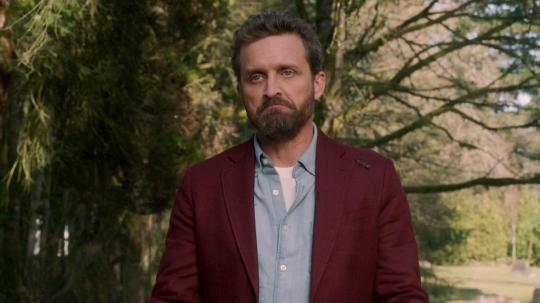
Holy Hell: 3. Metanarrativity: Who’s the Deleuze and who’s the Guattari in your relationship? aka the analysis no one asked for.
In this ep, we delve into authorship, narrative, fandom and narrative meaning. And somehow, as always, bring it back to Cas and Misha Collins.
(Note: the reason I didn’t talk about Billie’s authorship and library is because I completely forgot it existed until I watched season 13 “Advanced Thanatology” again, while waiting for this episode to upload. I’ll find a way to work her into later episodes tho!)
I had to upload it as a new podcast to Spotify so if you could just re-subscribe that would be great! Or listen to it at these other links.
Please listen to the bit at the beginning about monetisation and if you have any questions don’t hesitate to message me here.
Apple | Spotify | Google
Transcript under the cut!
Warnings: discussions of incest, date rape, rpf, war, 9/11, the bush administration, abuse, mental health, addiction, homelessness. Most of these are just one off comments, they’re not full discussions.
Meta-Textuality: Who’s the Deleuze and who’s the Guattari in your relationship?
In the third episode of Season 6, “The Third Man,” Balthazar says to Cas, “you tore up the whole script and burned the pages.” That is the fundamental idea the writers of the first five seasons were trying to sell us: whatever grand plan the biblical God had cooking up is worth nothing in face of the love these men have—for each other and the world. Sam, Bobby, Cas and Dean will go to any lengths to protect one another and keep people safe. What’s real? What’s worth saving? People are real. Families are worth saving.
This show plugs free will as the most important thing a person, angel, demon or otherwise can have. The fact of the matter is that Dean was always going to fight against the status quo, Sam was always going to go his own way, and Bobby was always going to do his best for his boys. The only uncertainty in the entire narrative is Cas. He was never meant to rebel. He was never meant to fall from Heaven. He was supposed to fall in line, be a good soldier, and help bring on the apocalypse, but Cas was the first agent of free will in the show’s timeline. Sam followed Lucifer, Dean followed Michael, and John gave himself up for the sins of his children, at once both a God and Jesus figure. But Cas wasn’t modelled off anyone else. He is original. There are definitely some parallels to Ruby, but I would argue those are largely unintentional. Cas broke the mold.
That’s to say nothing of the impact he’s had on the fanbase, and the show itself, which would not have reached 15 seasons and be able to end the way they wanted it to without Cas and Misha Collins. His back must be breaking from carrying the entire show.
But what the holy hell are we doing here today? Not just talking about Cas. We’re talking about metanarrativity: as I define it, and for purposes of this episode, the story within a story, and the act of storytelling. We’re going to go through a select few episodes which I think exemplify the best of what this show has to offer in terms of framing the narrative. We’ll talk about characters like Chuck and Becky and the baby dykes in season 10. And most importantly we’ll talk about the audience’s role, our role, in the reciprocal relationship of storytelling. After all, a tv show is nothing without the viewer.
I was in fact introduced to the concept of metanarrativity by Supernatural, so the fact that I’m revisiting it six years after I finished my degree to talk about the show is one of life’s little jokes.
I’m brushing off my degree and bringing out the big guns (aka literary theorists) to examine this concept. This will be yet another piece of analysis that would’ve gone well in my English Lit degree, but I’ll try not to make it dry as dog shit.
First off, I’m going to argue that the relationship between the creators of Supernatural and the fans has always been a dialogue, albeit with a power imbalance. Throughout the series, even before explicitly metanarrative episodes like season 10 “Fan Fiction” and season 4 “the monster at the end of this book,” the creators have always engaged in conversations with the fans through the show. This includes but is not limited to fan conventions, where the creators have actual, live conversations with the fans. Misha Collins admitted at a con that he’d read fanfiction of Cas while he was filming season 4, but it’s pretty clear even from the first season that the creators, at the very least Eric Kripke, were engaging with fans. The show aired around the same time as Twitter and Tumblr were created, both of which opened up new passageways for fans to interact with each other, and for Twitter and Facebook especially, new passageways for fans to interact with creators and celebrities.
But being the creators, they have ultimate control over what is written, filmed and aired, while we can only speculate and make our own transformative interpretations. But at least since s4, they have engaged in meta narrative construction that at once speaks to fans as well as expands the universe in fun and creative ways. My favourite episodes are the ones where we see the Winchesters through the lens of other characters, such as the season 3 episode “Jus In Bello,” in which Sam and Dean are arrested by Victor Henriksen, and the season 7 episode “Slash Fiction” in which Dean and Sam’s dopplegangers rob banks and kill a bunch of people, loathe as I am to admit that season 7 had an effect on any part of me except my upchuck reflex. My second favourite episodes are the meta episodes, and for this episode of Holy Hell, we’ll be discussing a few: The French Mistake, he Monster at the end of this book, the real ghostbusters, Fan Fiction, Metafiction, and Don’t Call Me Shurley. I’ll also discuss Becky more broadly, because, like, of course I’ll be discussing Becky, she died for our sins.
Let’s take it back. The Monster At The End Of This Book — written by Julie Siege and Nancy Weiner and directed by Mike Rohl. Inarguably one of the better episodes in the first five seasons. Not only is Cas in it, looking so beautiful, but Sam gets something to do, thank god, and it introduces the character of Chuck, who becomes a source of comic relief over the next two seasons. The episode starts with Chuck Shurley, pen named Carver Edlund after my besties, having a vision while passed out drunk. He dreams of Sam and Dean larping as Feds and finding a series of books based on their lives that Chuck has written. They eventually track Chuck down, interrogate him, and realise that he’s a prophet of the lord, tasked with writing the Winchester Gospels. The B plot is Sam plotting to kill Lilith while Dean fails to get them out of the town to escape her. The C plot is Dean and Cas having a moment that strengthens their friendship and leads further into Cas’s eventual disobedience for Dean. Like the movie Disobedience. Exactly like the movie Disobedience. Cas definitely spits in Dean’s mouth, it’s kinda gross to be honest. Maybe I’m just not allo enough to appreciate art.
When Eric Kripke was showrunner of the first five seasons of Supernatural, he conceptualised the character of Chuck. Kripke as the author-god introduced the character of the author-prophet who would later become in Jeremy Carver’s showrun seasons the biblical God. Judith May Fathallah writes in “I’m A God: The Author and the Writing Fan in Supernatural” that Kripke writes himself both into and out of the text, ending his era with Chuck winking at the camera, saying, “nothing really ends,” and disappearing. Kripke stayed on as producer, continuing to write episodes through Sera Gamble’s era, and was even inserted in text in the season 6 episode “The French Mistake”. So nothing really does end, not Kripke’s grip on the show he created, not even the show itself, which fans have jokingly referred to as continuing into its 16th season. Except we’re not joking. It will die when all of us are dead, when there is no one left to remember it. According to W R Fisher, humans are homo narrans, natural storytellers. The Supernatural fandom is telling a fidelitous narrative, one which matches our own beliefs, values and experiences instead of that of canon. Instead of, at Fathallah says, “the Greek tradition, that we should struggle to do the right thing simply because it is right, though we will suffer and be punished anyway,” the fans have created an ending for the characters that satisfies each and every one of our desires, because we each create our own endings. It’s better because we get to share them with each other, in the tradition of campfire stories, each telling our own version and building upon the others. If that’s not the epitome of mythmaking then I don’t know. It’s just great. Dean and Cas are married, Eileen and Sam are married, Jack is sometimes a baby who Claire and Kaia are forced to babysit, Jody and Donna are gonna get hitched soon. It’s season 17, time for many weddings, and Kevin Tran is alive. Kripke, you have no control over this anymore, you crusty hag.
Chuck is introduced as someone with power, but not influence over the story, only how the story is told through the medium of the novels. It’s basically a very badly written, non authorised biography, and Charlie reading literally every book and referencing things she should have no knowledge of is so damn creepy and funny. At first Chuck is surprised by his characters coming to life, despite having written it already, and when shown the intimidating array of weapons in Baby’s trunk he gets real scared. Which is the appropriate response for a skinny 5-foot-8 white guy in a bathrobe who writes terrible fantasy novels for a living.
As far as I can remember, this is the first explicitly metanarrative episode in the series, or at least the first one with in world consequences. It builds upon the lore of Christianity, angels, and God, while teasing what’s to come. Chuck and Sam have a conversation about how the rest of the season is going to play out, and Sam comes away with the impression that he’ll go down with the ship. They touch on Sam’s addiction to demon blood, which Chuck admits he didn’t write into the books, because in the world of supernatural, addiction should be demonised ha ha at every opportunity, except for Dean’s alcoholism which is cool and manly and should never be analysed as an unhealthy trauma coping mechanism.
Chuck is mostly impotent in the story of Sam and Dean, but his very presence presents an element of good luck that turns quickly into a force of antagonism in the series four finale, “Lucifer Rising”, when the archangel Raphael who defeats Lilith in this episode also kills Cas in the finale. It’s Cas’s quick thinking and Dean’s quick doing that resolve the episode and save them from Lilith, once again proving that free will is the greatest force in the universe. Cas is already tearing up pages and burning scripts. The fandom does the same, acting as gods of their own making in taking canon and transforming it into fan art. The fans aren’t impotent like Chuck, but neither do we have sway over the story in the way that Cas and Dean do. Sam isn’t interested in changing the story in the same way—he wants to kill Lilith and save the world, but in doing so continues the story in the way it was always supposed to go, the way the angels and the demons and even God wanted him to.
Neither of them are author-gods in the way that God is. We find out later that Chuck is in fact the real biblical god, and he engineers everything. The one thing he doesn’t engineer, however, is Castiel, and I’ll get to that in a minute.
The Real Ghostbusters
Season 5’s “The real ghostbusters,” written by Nancy Weiner and Erik Kripke, and directed by James L Conway, situates the Winchesters at a fan convention for the Supernatural books. While there, they are confronted by a slew of fans cosplaying as Sam, Dean, Bobby, the scarecrow, Azazel, and more. They happen to stumble upon a case, in the midst of the game where the fans pretend to be on a case, and with the help of two fans cosplaying as Sam and Dean, they put to rest a group of homicidal ghost children and save the day. Chuck as the special guest of the con has a hero moment that spurs Becky on to return his affections. And at the end, we learn that the Colt, which they’ve been hunting down to kill the devil, was given to a demon named Crowley. It’s a fun episode, but ultimately skippable. This episode isn’t so much metanarrative as it is metatextual—metatextual meaning more than one layer of text but not necessarily about the storytelling in those texts—but let’s take a look at it anyway.
The metanarrative element of a show about a series of books about the brothers the show is based on is dope and expands upon what we saw in “the monster at the end of this book”. But the episode tells a tale about about the show itself, and the fandom that surrounds it.
Where “The Monster At The End Of This Book” and the season 5 premiere “Sympathy For The Devil” poked at the coiled snake of fans and the concept of fandom, “the real ghostbusters” drags them into the harsh light of an enclosure and antagonises them in front of an audience. The metanarrative element revolves around not only the books themselves, but the stories concocted within the episode: namely Barnes and Demian the cosplayers and the story of the ghosts. The Winchester brothers’s history that we’ve seen throughout the first five seasons of the show is bared in a tongue in cheek way: while we cried with them when Sam and Dean fought with John, now the story is thrown out in such a way as to mock both the story and the fans’ relationship to it. Let me tell you, there is a lot to be made fun of on this show, but the fans’ relationship to the story of Sam, Dean and everyone they encounter along the way isn’t part of it. I don’t mean to be like, wow you can’t make fun of us ever because we’re special little snowflakes and we take everything so seriously, because you are welcome to make fun of us, but when the creators do it, I can’t help but notice a hint of malice. And I think that’s understandable in a way. Like The relationship between creator and fan is both layered and symbiotic. While Kripke and co no doubt owe the show’s popularity to the fans, especially as the fandom has grown and evolved over time, we’re not exactly free of sin. And don’t get me wrong, no fandom is. But the bad apples always seem to outweigh the good ones, and bad experiences can stick with us long past their due.
However, portraying us as losers with no lives who get too obsessed with this show — well, you know, actually, maybe they’re right. I am a loser with no life and I am too obsessed with this show. So maybe they have a point. But they’re so harsh about it. From wincestie Becky who they paint as a desperate shrew to these cosplayers who threaten Dean’s very perception of himself, we’re not painted in a very good light.
Dean says to Demian and Barnes, “It must be nice to get out of your mom’s basement.” He’s judging them for deriving pleasure from dressing up and pretending to be someone else for a night. He doesn’t seem to get the irony that he does that for a living. As the seasons wore on, the creators made sure to include episodes where Dean’s inner geek could run rampant, often in the form of dressing up like a cowboy, such as season six “Frontierland” and season 13 “Tombstone”. I had to take a break from writing this to laugh for five minutes because Dean is so funny. He’s a car gay but he only likes one car. He doesn’t follow sports. His echolalia causes him to blurt out lines from his favourite movies. He’s a posse magnet. And he loves cosplay. But he will continually degrade and insult anyone who expresses interest in role play, fandom, or interests in general. Maybe that’s why Sam is such a boring person, because Dean as his mother didn’t allow him to have any interests outside of hunting. And when Sam does express interests, Dean insults him too. What a dick. He’s my soulmate, but I am not going to stop listening to hair metal for him. That’s where I draw the line.
Where “the monster at the end of this book” is concerned with narrative and authorship, “the real ghostbusters” is concerned with fandom and fan reactions to the show. It’s not really the best example to talk about in an episode about metanarrativity, but I wanted to include it anyway. It veers from talk of narrative by focusing on the people in the periphery of the narrative—the fans and the author. In season 9 “Metafiction,” Metatron asks the question, who gives the story meaning? The text would have you believe it’s the characters. The angels think it’s God. The fandom think it’s us. The creators think it’s them. Perhaps we will never come to a consensus or even a satisfactory answer to this question. Perhaps that’s the point.
The ultimate takeaway from this episode is that ordinary people, the people Sam and Dean save, the people they save the world for, the people they die for again and again, are what give their story meaning. Chuck defeats a ghost and saves the people in the conference room from being murdered. Demian and Barnes, don’t ask me which is which, burn the bodies of the ghost children and lay their spirits to rest. The text says that ordinary, every day people can rise to the challenge of becoming extraordinary. It’s not a bad note to end on, by any means. And then we find out that Demian and Barnes are a couple, which of course Dean is surprised at, because he lacks object permanence.
This is no doubt influenced by how a good portion of the transformative fandom are queer, and also a nod to the wincesties and RPF writers like Becky who continue to bottom feed off the wrong message of this show. But then, the creators encourage that sort of thing, so who are the real clowns here? Everyone. Everyone involved with this show in any way is a clown, except for the crew, who were able to feed their families for more than a decade.
Okay side note… over the past year or so I’ve been in process of realising that even in fandom queers are in the minority. I know the statistic is that 10% of the world population is queer, but that doesn’t seem right to me? Maybe because 4/5 closest friends are queer and I hang around queers online, but I also think I lack object permanence when it comes to straight people. Like I just do not interact with straight people on a regular basis outside of my best friend and parents and school. So when I hear that someone in fandom is straight I’m like, what the fuck… can you keep that to yourself please? Like if I saw Misha Collins coming out as straight I would be like, I didn’t ask and you didn’t have to tell. Okay I’m mostly joking, but I do forget straight people exist. Mostly I don’t think about whether people are gay or trans or cis or straight unless they’ve explicitly said it and then yes it does colour my perception of them, because of course it would. If they’re part of the queer community, they’re my people. And if they’re straight and cis, then they could very well pose a threat to me and my wellbeing. But I never ask people because it’s not my business to ask. If they feel comfortable enough to tell me, that’s awesome. I think Dean feels the same way. Towards the later seasons at least, he has a good reaction when it’s revealed that someone is queer, even if it is mostly played off as a joke. It’s just that he doesn’t have a frame of reference in his own life to having a gay relationship, either his or someone he’s close to. He says to Cesar and Jesse in season 11 “The Critters” that they fight like brothers, because that’s the only way he knows how to conceptualise it. He doesn’t have a way to categorise his and Cas’s relationship, which is in many ways, long before season 15 “Despair,” harking back even to the parallels between Ruby and Cas in season 3 and 4, a romantic one, aside from that Cas is like a brother to him. Because he’s never had anyone in his life care for him the way Cas does that wasn’t Sam and Bobby, and he doesn’t recognise the romantic element of their relationship until literally Cas says it to him in the third last episode, he just—doesn’t know what his and Cas’s relationship is. He just really doesn’t know. And he grew up with a father who despised him for taking the mom and wife role in their family, the role that John placed him in, for being subservient to John’s wishes where Sam was more rebellious, so of course he wouldn’t understand either his own desires or those of anyone around him who isn’t explicitly shoving their tits in his face. He moulded his entire personality around what he thought John wanted of him, and John says to him explicitly in season 14 “Lebanon”, “I thought you’d have a family,” meaning, like him, wife and two rugrats. And then, dear god, Dean says, thinking of Sam, Cas, Jack, Claire, and Mary, “I have a family.” God that hurts so much. But since for most of his life he hasn’t been himself, he’s been the man he thought his father wanted him to be, he’s never been able to examine his own desires, wants and goals. So even though he’s really good at reading people, he is not good at reading other people’s desires unless they have nefarious intentions. Because he doesn’t recognise what he feels is attraction to men, he doesn’t recognise that in anyone else.
Okay that’s completely off topic, wow. Getting back to metanarrativity in “The Real Ghostbusters,” I’ll just cap it off by saying that the books in this episode are more a frame for the events than the events themselves. However, there are some good outtakes where Chuck answers some questions, and I’m not sure how much of that is scripted and how much is Rob Benedict just going for it, but it lends another element to the idea of Kripke as author-god. The idea of a fan convention is really cool, because at this point Supernatural conventions had been running for about 4 years, since 2006. It’s definitely a tribute to the fans, but also to their own self importance. So it’s a mixed bag, considering there were plenty of elements in there that show the good side of fandom and fans, but ultimately the Winchesters want nothing to do with it, consider it weird, and threaten Chuck when he says he’ll start releasing books again, which as far as they know is his only source of income. But it’s a fun episode and Dean is a grouchy bitch, so who the holy hell cares?
Season 10 episode “fanfiction” written by my close personal friend Robbie Thompson and directed by Phil Sgriccia is one of the funniest episodes this show has ever done. Not only is it full of metatextual and metanarrative jokes, the entire premise revolves around fanservice, but in like a fun and interesting way, not fanservice like killing the band Kansas so that Dean can listen to “Carry On My Wayward Son” in heaven twice. Twice. One version after another. Like I would watch this musical seven times in theatre, I would buy the soundtrack, I would listen to it on repeat and make all my friends listen to it when they attend my online Jitsi birthday party. This musical is my Hamilton. Top ten episodes of this show for sure. The only way it could be better is if Cas was there. And he deserved to be there. He deserved to watch little dyke Castiel make out with her girlfriend with her cute little wings, after which he and Dean share uncomfortable eye contact. Dean himself is forever coming to terms with the fact that gay people exist, but Cas should get every opportunity he can to hear that it’s super cool and great and awesome to be queer. But really he should be in every episode, all of them, all 300 plus episodes including the ones before angels were introduced. I’m going to commission the guy who edits Paddington into every movie to superimpose Cas standing on the highway into every episode at least once.
“Fan Fiction” starts with a tv script and the words “Supernatural pilot created by Eric Kripke”. This Immediately sets up the idea that it’s toying with narrative. Blah blah blah, some people go missing, they stumble into a scene from their worst nightmares: the school is putting on a musical production of a show inspired by the Supernatural books. It’s a comedy of errors. When people continue to go missing, Sam and Dean have to convince the girls that something supernatural is happening, while retaining their dignity and respect. They reveal that they are the real Sam and Dean, and Dean gives the director Marie a summary of their lives over the last five seasons, but they aren’t taken seriously. Because, like, of course they aren’t. Even when the girls realise that something supernatural is happening, they don’t actually believe that the musical they’ve made and the series of books they’re basing it on are real. Despite how Sam and Dean Winchester were literal fugitives for many years at many different times, and this was on the news, and they were wanted by the FBI, despite how they pretend to be FBI, and no one mentions it??? Did any of the staffwriters do the required reading or just do what I used to do for my 40 plus page readings of Baudrillard and just skim the first sentence of every paragraph? Neat hack for you: paragraphs are set up in a logical order of Topic, Example, Elaboration, Linking sentence. Do you have to read 60 pages of some crusty French dude waxing poetic about how his best friend Pierre wants to shag his wife and making that your problem? Read the first and last sentence of every paragraph. Boom, done. Just cut your work in half.
The musical highlights a lot of the important moments of the show so far. The brothers have, as Charlie Bradbury says, their “broment,” and as Marie says, their “boy melodrama scene,” while she insinuates that there is a sexual element to their relationship. This show never passed up an opportunity to mention incest. It’s like: mentioning incest 5000 km, not being disgusting 1 km, what a hard decision. Actually, they do have to walk on their knees for 100 miles through the desert repenting. But there are other moments—such as Mary burning on the ceiling, a classic, Castiel waiting for Dean at the side of the highway, and Azazel poisoning Sam. With the help of the high schoolers, Sam and Dean overcome Calliope, the muse and bad guy of the episode, and save the day. What began as their lives reinterpreted and told back to them turns into a story they have some agency over.
In this episode, as opposed to “The Monster At The End Of This Book,” The storytelling has transferred from an alcoholic in a bathrobe into the hands of an overbearing and overachieving teenage girl, and honestly why not. Transformative fiction is by and large run by women, and queer women, so Marie and her stage manager slash Jody Mills’s understudy Maeve are just following in the footsteps of legends. This kind of really succinctly summarises the difference between curative fandom and transformative fandom, the former of which is populated mostly by men, and the latter mostly by women. As defined by LordByronic in 2015, Curative fandom is more like enjoying the text, collecting the merchandise, organising the knowledge — basically Reddit in terms of fandom curation. Transformative fandom is transforming the source text in some way — making fanart, fanfic, mvs, or a musical — basically Tumblr in general, and Archive of our own specifically. Like what do non fandom people even do on Tumblr? It is a complete mystery to me. Whereas Chuck literally writes himself into the narrative he receives through visions, Marie and co have agency and control over the narrative by writing it themselves.
Chuck does appear in the episode towards the end, his first appearance after five seasons. The theory that he killed those lesbian theatre girls makes me wanna curl up and die, so I don’t subscribe to it. Chuck watched the musical and he liked it and he gave unwarranted notes and then he left, the end.
The Supernatural creative team is explicitly acknowledging the fandom’s efforts by making this episode. They’re writing us in again, with more obsessive fans, but with lethbians this time, which makes it infinitely better. And instead of showing us as potential date rapists, we’re just cool chicks who like to make art. And that’s fucken awesome.
I just have to note that the characters literally say the word Destiel after Dean sees the actors playing Dean and Cas making out. He storms off and tells Sam to shut the fuck up when Sam makes fun of him, because Dean’s sexuality is NOT threatened he just needs to assert his dominance as a straight hetero man who has NEVER looked at another man’s lips and licked his own. He just… forgets that gay people exist until someone reminds him. BUT THEN, after a rousing speech that is stolen from Rent or Wicked or something, he echoes Marie’s words back, saying “put as much sub into that text as you possibly can.” What does Dean know about subbing, I wonder. Okay I’m suddenly reminded that he did literally go to a kink bar and get hit on by a leather daddy. Oh Dean, the experiences you have as a broad-shouldered, pixie-faced man with cowboy legs. You were born for this role.
Metatron is my favourite villain. As one tumblr user pointed out, he is an evil English literature major, which is just a normal English literature major. The season nine episode “Meta Fiction” written by my main man robbie thompson and directed by thomas j wright, happens within a curious season. Castiel, once again, becomes the leader of a portion of the heavenly host to take down Metatron, and Dean is affected by the Mark Of Cain. Sam was recently possessed by Gadreel, who killed Kevin in Sam’s body and then decided to run off with Metatron. Metatron himself is recruiting angels to join him, in the hopes that he can become the new God. It’s the first introduction of Hannah, who encourages Cas to recruit angels himself to take on Metatron. Also, we get to see Gabriel again, who is always a delight.
This episode is a lot of fun. Metatron poses questions like, who tells a story and who is the most important person in the telling? Is it the writer? The audience? He starts off staring over his typewriter to address the camera, like a pompous dickhead. No longer content with consuming stories, he’s started to write his own. And they are hubristic ones about becoming God, a better god than Chuck ever was, but to do it he needs to kill a bunch of people and blame it on Cas. So really, he’s actually exactly like Chuck who blamed everything on Lucifer.
But I think the most apt analogy we can use for this in terms of who is the creator is to think of Metatron as a fanfiction writer. He consumes the media—the Winchester Gospels—and starts to write his own version of events—leading an army to become God and kill Cas. Nevermind that no one has been able to kill Cas in a way that matters or a way that sticks. Which is canon, and what Metatron is trying to do is—well not fanon because it actually does impact the Winchesters’ storyline. It would be like if one of the writers of Supernatural began writing Supernatural fanfiction before they got a job on the show. Which as my generation and the generations coming after me get more comfortable with fanfiction and fandom, is going to be the case for a lot of shows. I think it’s already the case for Riverdale. Correct me if I’m wrong, but didn’t the woman who wrote the bi Dean essay go to work on Riverdale? Or something? I dunno, I have the post saved in my tumblr likes but that is quagmire of epic proportions that I will easily get lost in if I try to find it.
Okay let me flex my literary degree. As Englund and Leach say in “Ethnography and the metanarratives of modernity,” “The influential “literary turn,” in which the problems of ethnography were seen as largely textual and their solutions as lying in experimental writing seems to have lost its impetus.” This can be taken to mean, in the context of Supernatural, that while Metatron’s writings seek to forge a new path in history, forgoing fate for a new kind of divine intervention, the problem with Metatron is that he’s too caught up in the textual, too caught up in the writing, to be effectual. And this as we see throughout seasons 9, 10 and 11, has no lasting effect. Cas gets his grace back, Dean survives, and Metatron becomes a powerless human. In this case, the impetus is his grace, which he loses when Cas cuts it out of him, a mirror to Metatron cutting out Cas’s grace.
However, I realise that the concept of ethnography in Supernatural is a flawed one, ethnography being the observation of another culture: a lot of the angels observe humanity and seem to fit in. However, Cas has to slowly acclimatise to the Winchesters as they tame him, but he never quite fit in—missing cues, not understanding jokes or Dean’s personal space, the scene where he says, “We have a guinea pig? Where?” Show him the guinea pig Sam!!! He wants to see it!!! At most he passes as a human with autism. Cas doesn’t really observe humanity—he observes nature, as seen in season 7 “reading is fundamental” and “survival of the fittest”. Even the human acts he talks about in season 6 “the man who would be king” are from hundreds or thousands of years ago. He certainly doesn’t observe popular culture, which puts him at odds with Dean, who is made up of 90 per cent pop culture references and 10 per cent flannel. Metatron doesn’t seek to blend in with humanity so much as control it, which actually is the most apt example of ethnography for white people in the last—you know, forever. But of course the writers didn’t seek to make this analogy. It is purely by chance, and maybe I’m the only person insane enough to realise it. But probably not. There are a lot of cookies much smarter than me in the Supernatural fandom and they’ve like me have grown up and gone to university and gotten real jobs in the real world and real haircuts. I’m probably the only person to apply Englund and Leach to it though.
And yes, as I read this paper I did need to have one tab open on Google, with the word “define” in the search bar.
Metatron has a few lines in this that I really like. He says:
“The universe is made up of stories, not atoms.”
“You’re going to have to follow my script.”
“I’m an entity of my word.”
It’s really obvious, but they’re pushing the idea that Metatron has become an agent of authorship instead of just a consumer of media. He even throws a Supernatural book into his fire — a symbolic act of burning the script and flipping the writer off, much like Cas did to God and the angels in season 5. He’s not a Kripke figure so much as maybe a Gamble, Carver or Dabb figure, in that he usurps Chuck and becomes the author-god. This would be extremely postmodern of him if he didn’t just do exactly what Chuck was doing, except worse somehow. In fact, it’s postmodern of Cas to reject heaven’s narrative and fall for Dean. As one tumblr user points out, Cas really said “What’s fate compared to Dean Winchester?”
Okay this transcript is almost 8000 words already, and I still have two more episodes to review, and more things to say, so I’ll leave you with this. Metatron says to Cas, “Out of all of God’s wind up toys, you’re the only one with any spunk.” Why Cas has captured his attention comes down more than anything to a process of elimination. Most angels fucking suck. They follow the rules of whoever puts themselves in charge, and they either love Cas or hate him, or just plainly wanna fuck him, and there have been few angels who stood out. Balthazar was awesome, even though I hated him the first time I watched season 6. He UNSUNK the Titanic. Legend status. And Gabriel was of course the OG who loves to fuck shit up. But they’re gone at this stage in the narrative, and Cas survives. Cas always survives. He does have spunk. And everyone wants to fuck him.
Season 11 episode 20 “Don’t Call Me Shurley,” the last episode written by the Christ like figure of Robbie Thompson — are we sensing a theme here? — and directed by my divine enemy Robert Singer, starts with Metatron dumpster diving for food. I’m not even going to bother commenting on this because like… it’s supernatural and it treats complex issues like homelessness and poverty with zero nuance. Like the Winchesters live in poverty but it’s fun and cool because they always scrape by but Metatron lives in poverty and it’s funny. Cas was homeless and it was hard but he needed to do it to atone for his sins, and Metatron is homeless and it’s funny because he brought it on himself by being a murderous dick. Fucking hell. Robbie, come on. The plot focuses on God, also known as Chuck Shurley, making himself known to Metatron and asking for Metatron’s opinion on his memoir. Meanwhile, the Winchesters battle another bout of infectious serial killer fog sent by Amara. At the end of the episode, Chuck heals everyone affected by the fog and reveals himself to Sam and Dean.
Chuck says that he didn’t foresee Metatron trying to become god, but the idea of Season 15 is that Chuck has been writing the Winchesters’ story all their lives. When Metatron tries, he fails miserably, is locked up in prison, tortured by Dean, then rendered useless as a human and thrown into the world without a safety net. His authorship is reduced to nothing, and he is reduced to dumpster diving for food. He does actually attempt to live his life as someone who records tragedies as they happen and sells the footage to news stations, which is honestly hilarious and amazing and completely unsurprising because Metatron is, at the heart of it, an English Literature major. In true bastard style, he insults Chuck’s work and complains about the bar, but slips into his old role of editor when Chuck asks him to.
The theory I’m consulting for this uses the term metanarrative in a different way than I am. They consider it an overarching narrative, a grand narrative like religion. Chuck’s biography is in a sense most loyal to Middleton and Walsh’s view of metanarrative: “the universal story of the world from arche to telos, a grand narrative encompassing world history from beginning to end.” Except instead of world history, it’s God’s history, and since God is construed in Supernatural as just some guy with some powers who is as fallible as the next some guy with some powers, his story has biases and agendas. Okay so in the analysis I’m getting Middleton and Walsh’s quotes from, James K A Smith’s “A little story about metanarratives,” Smith dunks on them pretty bad, but for Supernatural purposes their words ring true. Think of them as the BuckLeming of Lyotard’s postmodern metanarrative analysis: a stopped clock right twice a day. Is anyone except me understanding the sequence of words I’m saying right now. Do I just have the most specific case of brain worms ever found in human history. I’m currently wearing my oversized Keith Haring shirt and dipping pretzels into peanut butter because it’s 3.18 in the morning and the homosexuals got to me. The total claims a comprehensive metanarrative of world history make do indeed, as Middleton and Walsh claim, lead to violence, stay with me here, because Chuck’s legacy is violence, and so is Metatron’s, and in trying to reject the metanarrative, Sam and Dean enact violence. Mostly Dean, because in season 15 he sacrifices his own son twice to defeat Chuck. But that means literally fighting violence with violence. Violence is, after all, all they know. Violence is the lens through which they interact with the world. If the writers wanted to do literally anything else, they could have continued Dean’s natural character progression into someone who eschews the violence that stems from intergeneration trauma — yes I will continue to use the phrase intergenerational trauma whenever I refer to Dean — and becomes a loving father and husband. Sam could eschew violence and start a monster rehabilitation centre with Eileen.
This episode of Holy Hell is me frantically grabbing at straws to make sense of a narrative that actively hates me and wants to kick me to death. But the violence Sam and Dean enact is not at a metanarrative level, because they are not author-gods of their own narrative. In season 15 “Atomic Monsters,” Becky points out that the ending of the Supernatural book series is bad because the brothers die, and then, in a shocking twist of fate, Dean does die, and the narrative is bad. The writers set themselves a goal post to kick through and instead just slammed their heat into the bars. They set up the dartboard and were like, let’s aim the darts at ourselves. Wouldn’t that be fun. Season 15’s writing is so grossly incompetent that I believe every single conspiracy theory that’s come out of the finale since November, because it’s so much more compelling than whatever the fuck happened on the road so far. Carry on? Why yes, I think I will carry on, carry on like a pork chop, screaming at the bars of my enclosure until I crack my voice open like an egg and spill out all my rage and frustration. The world will never know peace again. It’s now 3.29 and I’ve written over 9000 words of this transcript. And I’m not done.
Middleton and Walsh claim that metanarratives are merely social constructions masquerading as universal truths. Which is, exactly, Supernatural. The creators have constructed this elaborate web of narrative that they want to sell us as the be all and end all. They won’t let the actors discuss how they really feel about the finale. They won’t let Misha Collins talk about Destiel. They want us to believe it was good, actually, that Dean, a recovering alcoholic with a 30 year old infant son and a husband who loves him, deserved to die by getting NAILED, while Sam, who spent the last four seasons, the entirety of Andrew Dabb’s run as showrunner, excelling at creating a hunter network and romancing both the queen of hell and his deaf hunter girlfriend, should have lived a normie life with a normie faceless wife. Am I done? Not even close. I started this episode and I’m going to finish it.
When we find out that Chuck is God in the episode of season 11, it turns everything we knew about Chuck on its head. We find out in Season 15 that Chuck has been writing the Winchesters’ story all along, that everything that happened to them is his doing. The one thing he couldn’t control was Cas’s choice to rebel. If we take him at his word, Cas is the only true force of free will in the entire universe, and more specifically, the love that Cas had for Dean which caused him to rebel and fall from heaven. — This theory has holes of course. Why would Lucifer torture Lilith into becoming the first demon if he didn’t have free will? Did Chuck make him do that? And why? So that Chuck could be the hero and Lucifer the bad guy, like Lucifer claimed all along? That’s to say nothing of Adam and Eve, both characters the show introduced in different ways, one as an antagonist and the other as the narrative foil to Dean and Cas’s romance. Thinking about it makes my head hurt, so I’m just not gunna.
So Chuck was doing the writing all along. And as Becky claims in “Atomic Monsters,” it’s bad writing. The writers explicitly said, the ending Chuck wrote is bad because there’s no Cas and everyone dies, and then they wrote an ending where there is no Cas and everyone dies. So talk about self-fulfilling prophecies. Talk about giant craters in the earth you could see from 800 kilometres away but you still fell into. Meanwhile fan writers have the opportunity to write a million different endings, all of which satisfy at least one person. The fandom is a hydra, prolific and unstoppable, and we’ll keep rewriting the ending a million more times.
And all this is not even talking about the fact that Chuck is a man, Metatron is a man, Sam and Dean and Cas are men, and the writers and directors of the show are, by an overwhelming majority, men. Most of them are white, straight, cis men. Feminist scholarship has done a lot to unpack the damage done by paternalistic approaches to theory, sociology, ethnography, all the -ys, but I propose we go a step further with these men. Kill them. Metanarratively, of course. Amara, the Darkness, God’s sister, had a chance to write her own story without Chuck, after killing everything in the universe, and I think she had the right idea. Knock it all down to build it from the ground up. Billie also had the opportunity to write a narrative, but her folly was, of course, putting any kind of faith in the Winchesters who are also grossly incompetent and often fail up. She is, as all author-gods on this show are, undone by Castiel. The only one with any spunk, the only one who exists outside of his own narrative confines, the only one the author-gods don’t have any control over. The one who died for love, and in dying, gave life.
The French Mistake
Let’s change the channel. Let’s calm ourselves and cleanse our libras. Let’s commune with nature and chug some sage bongs.
“The French Mistake” is a song from the Mel Brooks film Blazing Saddles. In the iconic second last scene of the film, as the cowboys fight amongst themselves, the camera pans back to reveal a studio lot and a door through which a chorus of gay dancersingers perform “the French Mistake”. The lyrics go, “Throw out your hands, stick out your tush, hands on your hips, give ‘em a push. You’ll be surprised you’re doing the French Mistake.”
I’m not sure what went through the heads of the Supernatural creators when they came up with the season 6 episode, “The French Mistake,” written by the love of my life Ben Edlund and directed by some guy Charles Beeson. Just reading the Wikipedia summary is so batshit incomprehensible. In short: Balthazar sends Sam and Dean to an alternate universe where they are the actors Jared Padalecki and Jensen Ackles, who play Sam and Dean on the tv show Supernatural. I don’t think this had ever been done in television history before. The first seven seasons of this show are certifiable. Like this was ten years ago. Think about the things that have happened in the last 10 slutty, slutty years. We have lived through atrocities and upheaval and the entire world stopping to mourn, but also we had twitter throughout that entire time, which makes it infinitely worse.
In this universe, Sam and Dean wear makeup, Cas is played by attractive crying man Misha Collins, and Genevieve Padalecki nee Cortese makes an appearance. Magic doesn’t exist, Serge has good ideas, and the two leads have to act in order to get through the day. Sorry man I do not know how to pronounce your name.
Sidenote: I don’t know if me being attracted aesthetically to Misha Collins is because he’s attractive, because this show has gaslighted me into thinking he’s attractive, or because Castiel’s iconic entrance in 2008 hit my developing mind like a torpedo full of spaghetti and blew my fucking brains all over the place. It’s one of life’s little mysteries and God’s little gifts.
Let’s talk about therapy. More specifically, “Agency and purpose in narrative therapy: questioning the postmodern rejection of metanarrative” by Cameron Lee. In this paper, Lee outlines four key ideas as proposed by Freedman and Combs:
Realities are socially constructed
Realities are constituted through language
Realities are organised and maintained through narrative
And there are no essential truths.
Let’s break this down in the case of this episode. Realities are socially constructed: the reality of Sam and Dean arose from the Bush era. Do I even need to elaborate? From what I understand with my limited Australian perception, and being a child at the time, 9/11 really was a prominent shifting point in the last twenty years. As Americans describe it, sometimes jokingly, it was the last time they were really truly innocent. That means to me that until they saw the repercussions of their government’s actions in funding turf wars throughout the middle east for a good chunk of the 20th Century, they allowed themselves to be hindered by their own ignorance. The threat of terrorism ran rampant throughout the States, spurred on by right wing nationalists and gun-toting NRA supporters, so it’s really no surprise that the show Supernatural started with the premise of killing everything in sight and driving around with only your closest kin and a trunk full of guns. Kripke constructed that reality from the social-political climate of the time, and it has wrought untold horrors on the minds of lesbians who lived through the noughties, in that we are now attracted to Misha Collins.
Number two: Realities are constituted through language. Before a show can become a show, it needs to be a script. It’s written down, typed up, and given to actors who say the lines out loud. In this respect, they are using the language of speech and words to convey meaning. But tv shows are not all about words, and they’re barely about scripts. From what I understand of being raised by television, they are about action, visuals, imagery, and behaviours. All of the work that goes into them—the scripts, the lighting, the audio, the sound mixing, the cameras, the extras, the ADs, the gaffing, the props, the stunts, everything—is about conveying a story through the medium of images. In that way, images are the language. The reality of the show Supernatural, inside the show Supernatural, is constituted through words: the script, the journalists talking to Sam, the makeup artist taking off Dean’s makeup, the conversations between the creators, the tweets Misha sends. But also through imagery: the fish tank in Jensen’s trailer, the model poses on the front cover of the magazine, the opulence of Jared’s house, Misha’s iconic sweater. Words and images are the language that constitutes both of these realities. Okay for real, I feel like I’ve only seen this episode max three times, including when I watched it for research for this episode, but I remember so much about it.
Number three: realities are organised and maintained through narrative. In this universe of the French Mistake, their lives are structured around two narratives: the internal narrative of the show within the show, in which they are two actors on a tv set; and the episode narrative in which they need to keep the key safe and return to their own universe. This is made difficult by the revelation that magic doesn’t work in this universe, however, they find a way. Before they can get back, though, an avenging angel by the name of Virgil guns down author-god Eric Kripke and tries to kill the Winchesters. However, they are saved by Balthazar and the freeze frame and brought back into their own world, the world of Supernatural the show, not Supernatural the show within the show within the nesting doll. And then that reality is done with, never to be revisited or even mentioned, but with an impact that has lasted longer than the second Bush administration.
And number four: there are no essential truths. This one is a bit tricky because I can’t find what Lee means by essential truths, so I’m just going to interpret that. To me, essential truths means what lies beneath the narratives we tell ourselves. Supernatural was a show that ran for 15 years. Supernatural had actors. Supernatural was showrun by four different writers. In the show within a show, there is nothing, because that ceases to exist for longer than the forty two minute episode “The French Mistake”. And since Supernatural no longer exists except in our computers, it is nothing too. It is only the narratives we tell ourselves to sleep better at night, to wake up in the morning with a smile, to get through the day, to connect with other people, to understand ourselves better. It’s not even the narrative that the showrunners told, because they have no agency over it as soon as it shows up on our screens. The essential truth of the show is lost in the translation from creating to consuming. Who gives the story meaning? The people watching it and the people creating it. We all do.
Lee says that humans are predisposed to construct narratives in order to make sense of the world. We see this in cultures from all over the world: from cave paintings to vases, from The Dreaming to Beowulf, humans have always constructed stories. The way you think about yourself is a story that you’ve constructed. The way you interact with your loved ones and the furries you rightfully cyberbully on Twitter is influenced by the narratives you tell yourself about them. And these narratives are intricate, expansive, personalised, and can colour our perceptions completely, so that we turn into a different person when we interact with one person as opposed to another.
Whatever happened in season 6, most of which I want to forget, doesn’t interest me in the way I’m telling myself the writers intended. For me, the entirety of season 6 was based around the premise of Cas being in love with Dean, and the complete impotence of this love. He turns up when Dean calls, he agonises as he watches Dean rake leaves and live his apple pie life with Lisa, and Dean is the person he feels most horribly about betraying. He says, verbatim, to Sam, “Dean and I do share a more profound bond.” And Balthazar says, “You’re confusing me with the other angel, the one in the dirty trenchcoat who’s in love with you.” He says this in season 6, and we couldn’t do a fucken thing about it.
The song “The French Mistake” shines a light on the hidden scene of gay men performing a gay narrative, in the midst of a scene about the manliest profession you can have: professional horse wrangler, poncho wearer, and rodeo meister, the cowboy. If this isn’t a perfect encapsulation of the lovestory between Dean and Cas, which Ben Edlund has been championing from day fucking one of Misha Collins walking onto that set with his sex hair and chapped lips, then I don’t know what the fuck we’re even doing here. What in the hell else could it possibly mean. The layers to this. The intricacy. The agendas. The subtextual AND blatant queerness. The micro aggressions Crowley aimed at Car in “The Man Who Would Be King,” another Bedlund special. Bed Edlund is a fucking genius. Bed Edlund is cool girl. Ben Edlund is the missing link. Bed Edlund IS wikileaks. Ben Edlund is a cool breeze on a humid summer day. Ben Edlund is the stop loading button on a browser tab. Ben Edlund is the perfect cross between Spotify and Apple Music, in which you can search for good playlists, but without having to be on Spotify. He can take my keys and fuck my wife. You best believe I’m doing an entire episode of Holy Hell on Bedlund’s top five. He is the reason I want to get into staffwriting on a tv show. I saw season 4 episode “On the head of a pin” when my brain was still torpedoed spaghetti mush from the premiere, and it nestled its way deep into my exposed bones, so that when I finally recovered from that, I was a changed person. My god, this transcript is 11,000 words, and I haven’t even finished the Becky section. Which is a good transition.
Oh, Becky. She is an incarnation of how the writers, or at least Kripke, view the fans. Watching season 5 “Sympathy for the Devil” live in 2009 was a whole fucking trip that I as a baby gay was not prepared for. Figuring out my sexuality was a journey that started with the Supernatural fandom and is in some aspects still raging against the dying of the light today. Add to that, this conception of the audience was this, like, personification of the librarian cellist from Juno, but also completely without boundaries, common sense, or shame. It made me wonder about my position in the narrative as a consumer consuming. Is that how Kripke saw me, specifically? Was I like Becky? Did my forays into DeanCasNatural on El Jay dot com make me a fucking loser whose only claim to fame is writing some nasty fanfiction that I’ve since deleted all traces of? Don’t get me wrong, me and my unhinged Casgirl friends loved Becky. I can’t remember if I ever wrote any fanfiction with her in it because I was mostly writing smut, which is extremely Becky coded of me, but I read some and my friends and I would always chat about her when she came up. She was great entertainment value before season 7. But in the eyes of the powers that be, Becky, like the fans themselves, are expendable. First they turned her into a desperate bride wannabe who drugs Sam so that he’ll be with her, then Chuck waves his hand and she disappears. We’re seeing now with regards to Destiel, Cas, and Misha Collins this erasure of them from the narrative. Becky says in season 15 “Atomic Monsters” that the ending Chuck writes is bad because, for one, there’s no Cas, and that’s exactly what’s happening to the text post-finale. It literally makes me insane akin to the throes of mania to think about the layers of this. They literally said, “No Cas = bad” and now Misha isn’t even allowed to talk in his Cassona voice—at least at the time I wrote that—to the detriment of the fans who care about him. It’s the same shit over and over. They introduce something we like, they realise they have no control over how much we like it, and then they pretend they never introduced it in the first place. Season 7, my god. The only reason Gamble brought back Cas was because the ratings were tanking the show. I didn’t even bother watching most of it live, and would just hear from my friends whether Cas was in the episodes or not. And then Sera, dear Sera, had the gall to say it was a Homer’s Odyssey narrative. I’m rusty on Homer aka I’ve never read it but apparently Odysseus goes away, ends up with a wife on an island somewhere, and then comes back to Terabithia like it never happened. How convenient. But since Sera Gamble loves to bury her gays, we can all guess why Cas was written out of the show: Cas being gay is a threat to the toxic heteronormativity spouted by both the show and the characters themselves. In season 15, after Becky gets her life together, has kids, gets married, and starts a business, she is outgrowing the narrative and Chuck kills her. The fans got Destiel Wedding trending on Twitter, and now the creators are acting like he doesn’t exist. New liver, same eagles.
I have to add an adendum: as of this morning, Sunday 11th, don’t ask me what time that is in Americaland, Misha Collins did an online con/Q&A thing and answered a bunch of questions about Cas and Dean, which goes to show that he cannot be silenced. So the narrative wants to be told. It’s continuing well into it’s 16th or 17th season. It’s going to keep happening and they have no recourse to stop it. So fuck you, Supernatural.
I did write the start of a speech about representation but, who the holy hell cares. I also read some disappointing Masters theses that I hope didn’t take them longer to research and write than this episode of a podcast I’m making for funsies took me, considering it’s the same number of pages. Then again I have the last four months and another 8 years of fandom fuelling my obsession, and when I don’t sleep I write, hence the 4,000 words I knocked out in the last 12 hours.
Some final words. Lyotard defines postmodernism, the age we live in, as an incredulity towards metanarratives. Modernism was obsessed with order and meaning, but postmodernism seeks to disrupt that. Modernists lived within the frame of the narrative of their society, but postmodernists seek to destroy the frame and live within our own self-written contexts. Okay I love postmodernist theory so this has been a real treat for me. Yoghurt, Sam? Postmodernist theory? Could I BE more gay?
Middleton and Walsh in their analysis of postmodernism claim that biblical faith is grounded in metanarrative, and explore how this intersects with an era that rejects metanarrative. This is one of the fundamental ideas Supernatural is getting at throughout definitely the last season, but other seasons as well. The narratives of Good vs Evil, Michael vs Lucifer, Dean vs Sam, were encoded into the overarching story of the show from season 1, and since then Sam and Dean have sought to break free of them. Sam broke free of John’s narrative, which was the hunting life, and revenge, and this moralistic machismo that they wrapped themselves up in. If they’re killing the evil, then they’re not the evil. That’s the story they told, and the impetus of the show that Sam was sucked back into. But this thread unravelled in later seasons when Dean became friends with Benny and the idea that all supernatural creatures are inherently evil unravelled as well. While they never completely broke free of John’s hold over them, welcoming Jack into their lives meant confronting a bias that had been ingrained in them since Dean was 4 years old and Sam 6 months. In the face of the question, “are all monsters monstrous?” the narrative loosens its control. Even by questioning it, it throws into doubt the overarching narrative of John’s plan, which is usurped at the end of season 2 when they kill Azazel by Dean’s demon deal and a new narrative unfolds. John as author-god is usurped by the actual God in season 4, who has his own narrative that controls the lives of Sam, Dean and Cas.
Okay like for real, I do actually think the metanarrativity in Supernatural is something that should be studied by someone other than me, unless you wanna pay me for it and then shit yeah. It is extremely cool to introduce a biographical narrative about the fictional narrative it’s in. It’s cool that the characters are constantly calling this narrative into focus by fighting against it, struggling to break free from their textual confines to live a life outside of the external forces that control them. And the thing is? The really real, honest thing? They have. Sam, Dean and Cas have broken free of the narrative that Kripke, Carver, Gamble and Dabb wrote for them. The very fact that the textual confession of love that Cas has for Dean ushered in a resurgence of fans, fandom and activity that has kept the show trending for five months after it ended, is just phenomenal. People have pointed out that fans stopped caring about Game of Thrones as soon as it ended. Despite the hold they had over tv watchers everywhere, their cultural currency has been spent. The opposite is true for Supernatural. Despite how the finale of the show angered and confused people, it gains more momentum every day. More fanworks, more videos, more fics, more art, more ire, more merch is being generated by the fans still. The Supernatural subreddit, which was averaging a few posts a week by season 15, has been incensed by the finale. And yours truly happily traipsed back into the fandom snake pit after 8 years with a smile on my face and a skip in my step ready to pump that dopamine straight into my veins babeeeeeeyyyyy. It’s been WILD. I recently reconnected with one of my mutuals from 2010 and it’s like nothing’s changed. We’re both still unhinged and we both still simp for Supernatural. Even before season 15, I was obsessed with the podcast Ride Or Die, which I started listening to in late 2019, and Supernatural was always in the back of my mind. You just don’t get over your first fandom. Actually, Danny Phantom was my first fandom, and I remember being 12 talking on Danny Phantom forums to people much too old to be the target audience of the show. So I guess that hasn’t left me either. And the fondest memories I have of Supernatural is how the characters have usurped their creators to become mythic, long past the point they were supposed to die a quiet death. The myth weaving that the Supernatural fandom is doing right now is the legacy that will endure.
References
I got all of these for free from Google Scholar!
Judith May Fathallah, “I’m A God: The Author and the Writing Fan in Supernatural.”
James K A Smith, “A Little Story About Metanarratives: Lyotard, Religion and Postmodernism Revisited.” 2001.
Cameron Lee, “Agency and Purpose in Narrative Therapy: Questioning the Postmodern Rejection of Metanarrative.” 2004.
Harri Englund and James Leach, “Ethnography and the Meta Narratives of Modernity.” 2000.
https://uproxx.com/filmdrunk/mel-brooks-explains-french-mistake-blazing-saddles-blu-ray/
#transcripts#supernatural#supernatural podcast#<60mins#this is first and foremost a podcast about cas and misha collins
12 notes
·
View notes
Text
So I’ve finally given up and I started watching She-Ra, I finished season 1 yesterday
I’ve always avoided it because the fandom... really did nothing to make it look appealing to me. And, I was half-right?
(disclaimer: I am not judging the entire show, I’m sure it will get better in future seasons)
The writing is so weird. It excels in interpersonal relationships, which is the most interesting part of a story to me. People have written essays on Catra and Adora’s relationship, and I have little to add. Glimmer and Angella is a great representation of a troubled but loving mother/daughter relationship! The friendship between Adora, Glimmer and Bow, while a bit rushed, is lovely and they bounce one off the other in an endearing way. The whole dynamic between Shadow Weaver, Adora and Catra is intriguing as well as painful, and I really want to see, what pushes SW to be so obsessed with Adora and so hateful towards Catra?
I also love the main villain trio. As sad (and unexpected, although I should have guessed it) as her face-heel turn was, I’m happy Entrapta became one of the bad guys, because I fell in love with her the moment I saw her and I’m glad she gets to be part of the Interesting People gang (and I’m going to be mean and say she’s a better writter Peridot don’t @me). Scorpia is adorable but quite creepy when she wants to be and I love the dissonance, and once again I don’t need to explain why Catra is such a great antagonist. I feel about her like I felt about Bojack, constantly torn between rooting for her and screaming “what the fuck are you doing you absolute idiot”.
I still don’t know how to feel about Shadow Weaver and Hordak, mostly because it’s obvious there’s more than meets the eye. The first one spent half of the season being so Obviously Evil that I found funny how Adora never questioned her (made worse by how quickly she deflected), but then she gradually revealed some weaknesses and by the end I almost felt sorry for her so... we’ll see? Apparently she becomes more sympathetic later. I haven’t seen enough of Hordak, but he seems far more reasonable than SW so he’s probably going to be a good villain.
And then everything else goes from average to mediocre.
The plot itself made me realize how many tropes we moved away from - the Chosen One, the Magical Sword of Destiny, pastel princesses... It’s not the writers’ fault the story is so dated, but it needs something to shake it up, and so far there’s been little of it - the most interesting part of the lore is whatever happened to Mara, and the implications of the She-Ra identity. Some of the plots themselves have been a bit on the cliché side - the hero that doesn’t know how to live up to the village’s expectations, the protagonist making a fool of themselves because nobody believes them, the whole “normal people can be useful too!” moral that other cartoons did in a more subtle manner... the only cliché I forgave relatively soon was Entrapta’s Disney Death, because as the next episode showed, it wasn’t us that were supposed to believe she was dead, the protagonists were.
The heroes themselves are... okay? Glimmer got a scene where she revealed the depths of her angst, and I’m a simple person, I see a child feeling like they disappointed their parents, I immediately connect to them (hello Amethyst and Bojack). But so far, Adora and Bow are far less interesting.
Adora is like a tamer version of Korra and Aang - as soon as I saw her and her ponytail I was like “she’s going to struggle with her new identity of savior of the universe because she doesn’t feel worthy”, and, well so far I’ve been right. I do find interesting how she keeps referring to She-Ra as her own separate identity while it’s clear it’s still Adora but in a fancy costume, but so far they haven’t explained why yet (there was a chance to create a disconnect between Adora and She-Ra in that episode with the robot virus, I was so sure they were going for a corrupted, evil She-Ra, but for some reason they ignored it in favor of “shitfaced Adora”... okay).
I also wish they used the “raised by the Horde” part of her backstory more than for a couple of jokes - so far the clearest sign of her messed up upbringing is that she sometimes takes a military approach to things that don’t need it. I still can’t accept that she, SW’s golden child, took a few hours at best before accepting the fact that she was raised in an evil army and that is not her place. A protagonist raised by the “evil” faction is a really interesting trope, I was actually surprised it comes from the original She-Ra! I’d like to see more serious consequences of that.
Bow is... Bow. He’s a feminine Sokka. I like Sokka just fine so it’s not a problem, but I’ll wait for his moment to reveal his deep-seated angst. My money is on “I have no powers and I can’t compete with all these magical people”.
Anyone else is there. Perfuma’s “bloodthirsty hippie” personality was funny, but Mermista has a punchable voice that prevents me from liking her (she reminds me too much of Mai and I never liked Mai), Frosta... I don’t know, I found her irritating the first time I saw her but there are good reasons for her acerbic personality so I can’t be too mad at her, Netossa and Spinnerella apparently will become important in season 4, and Seahawk is just plain annoying - he has his funny moments, but unless the writers manage to write a character with an Awesome Ego, I can’t stand buffoons full of themselves like him. But again, this is just for now.
I must say, despite all the disappointing stuff, there is still something that pushes me to keep going. Maybe it’s really just Catra and Adora’s relationship. I really wish the writers ignored all the princesses lore and focused more on their messed up friendship, because that is easily the highlight of the show.
5 notes
·
View notes
Text
Analyzing Questionable Content: Pages 101-150

While I’m all for body positivity Dora, that’s kind of public nudity. Most cities tend to frown on that. Although this IS your personal business you’re doing this in… I wonder what the law for that is? Like, do you have to pay for a permit to allow public nudity in a location you own? Or do city laws take precedent?
…I’m thinking about this too much, let’s move on.

Hey, it’s Raven again! Hi, Raven! And you thought I was kidding when I said the no-name character who showed up for all of one comic would come back as a regular character. This is part of the reason why I enjoy Jeph’s style – he can, and does, very easily take bit players he made for a single gag or to fulfill one role and flesh them out if he thinks they can serve a purpose or if they entertain him enough. The most famous example of this will be roughly 2900 comics from now so… holy shit, I just realized Bubbles is 1000 comics old! That’s crazy awesome!
Right. Sorry, some of you might not understand a word of what I just typed. Nevermind, moving right along.

Here we see the beginnings of Dora’s next character arc, if you’d like to call it that. I do have some questions about this as far as the in-universe time-scale goes, but I’ll touch on that later. Faye also invites Dora along to hang with her and Marten to indoctrinate her to the Hipster Lifestyle™ to serve two purposes: First, that their relationship as a boss and employee is relaxed enough that they’re comfortable doing this, telling us a lot about the way these two work together and the way this coffee shop is run without saying a lot. Second, this serves as the perfect in for Jeph to incorporate Dora into the main cast. From this point forward, Dora becomes a main secondary character, arguably a main character in her own right. The fact that she takes on a much more prominent role in this next batch of 50 comics and skyrockets to fourth-most frequent character is proof enough of that on its own, but we’ll touch on all that when we get to the data analysis at the end of this post.
Back with Marten, Steve is encouraging him to apologize to Faye. He offers a… novel solution to keep Marten from being the center of attention.

Seriously, the sheer, raw confidence on this guy alone is attractive as hell. And I’m only mildly ashamed to admit that to myself!
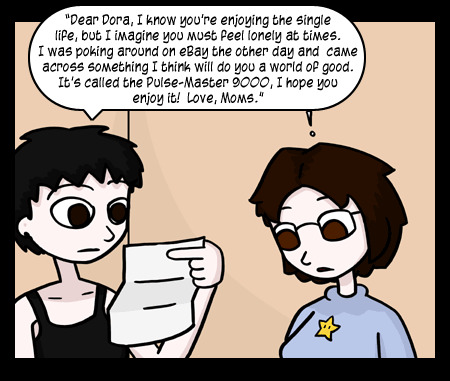
I hope you understand why I don’t need to explain why I should, nay, must provide this panel without any other context.
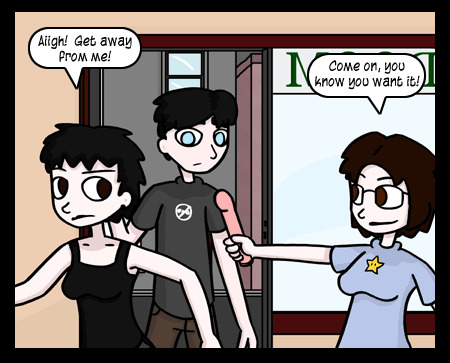
Same deal with this one.

And this comic puts me into hysterics every time I read it. I swear, this isn’t going to devolve into me just posting comics and saying “this is funny” or whatever. I just really, really like this progression of events right here. I wish we could see more of this Marten more often in modern QC – able to read a room quick enough to defuse the situation with absurdity or dry wit. It reminds us that, despite all evidence to the contrary, the boy does have a spine somewhere in that body.
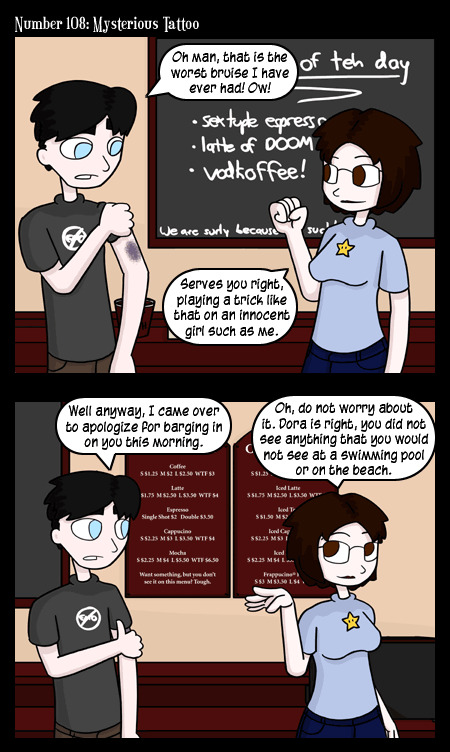
And as immediate contrast, we jump here. This? This isn’t funny. This makes me not like Faye. This is actual abuse. And I know I talked about in the last post how including Faye retaliating against Marten physically and actually showing it happen in the comic rather than implying it with backfilling is the better method of storytelling but… Maybe it’s because she created a visible bruise, maybe it’s because of how candid she is about it, maybe it’s because of my own personal fucked-up past relationships (which admittedly never got physical but still), but this feels infinitely different than the Faye Jeph is trying to set up. He’ll have to do a damn good job in later comics to win me back to thinking Faye’s a likable character again.

Also Dora is definitely a woman of her word. I hope the coffee shop was empty right then. Actually, I hope it’s been a slow day from the point Faye started chasing her around with a dildo. Otherwise news might travel for all of the wrong reasons.
Faye tries to invite Dora over for festivities both as a friendly gesture because she expects her boss doesn’t get out much and because she wants to drag her from the dark abyss of Goth into the light of Hipster, only for her to turn the invitation down.

Not that it’s going to deter Faye, of course. Also, QC is in wide screen now. I have NO idea how that’s going to be represented on Tumblr considering how narrow my current theme at the time of writing is. Maybe I’ll change it, I dunno, I’m shit with this sort of thing. If you’re reading this and the page doesn’tlook like some faux notebook shit, I pulled myself together and fixed things. Go me.

Dora is being incredibly chill with this whole situation. Personally I’d be a hell of a lot more pissed. Although this does provide us with further insight to Faye’s character – someone who sees her next step, bulrushes her way towards it and has zero plans where to go after that until she arrives at her destination. She is aggressive and decisive, but to a fault as she doesn’t ever seem to really plan ahead. I’d say this makes her the perfect foil to Marten as someone who plans obsessively but never has the spine to go forward with anything but… Marten doesn’t really do much future-planning himself. He obsesses over little things and gets stuck in his own head, but he never really seems to look any further than maybe next week. Hm… I want all of us to keep this in mind for an offhand comment like, 500 or 600 comics from now. Trust me, it’ll make sense when we get to it.
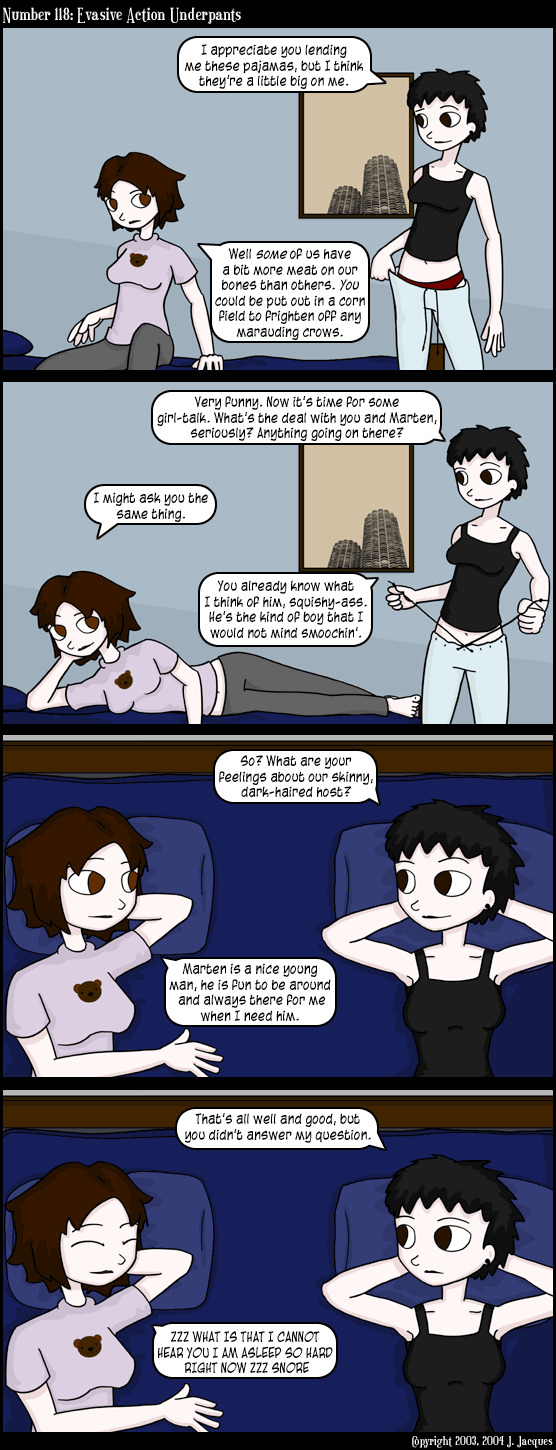
And yet despite Faye’s self-assurance and aggressive nature, here she shows an outright refusal to accept or face the reality of the developing relationship between herself and Marten. Not just being coy, not just dancing around the issue, but straight-up not allowing herself to even consider what’s going down. Maybe I’m reading too much into this little exchange due to what I already know about her character, but this is an extremely unhealthy trait that speaks a lot to Faye’s character that she doesn’t want the world to see. We’ll be touching on this later.

I mostly like this comic for Marten and Pintsize’s reactions on the last panel. Marten makes a good straight man, and it’s not often we see Pintsize share that role either.
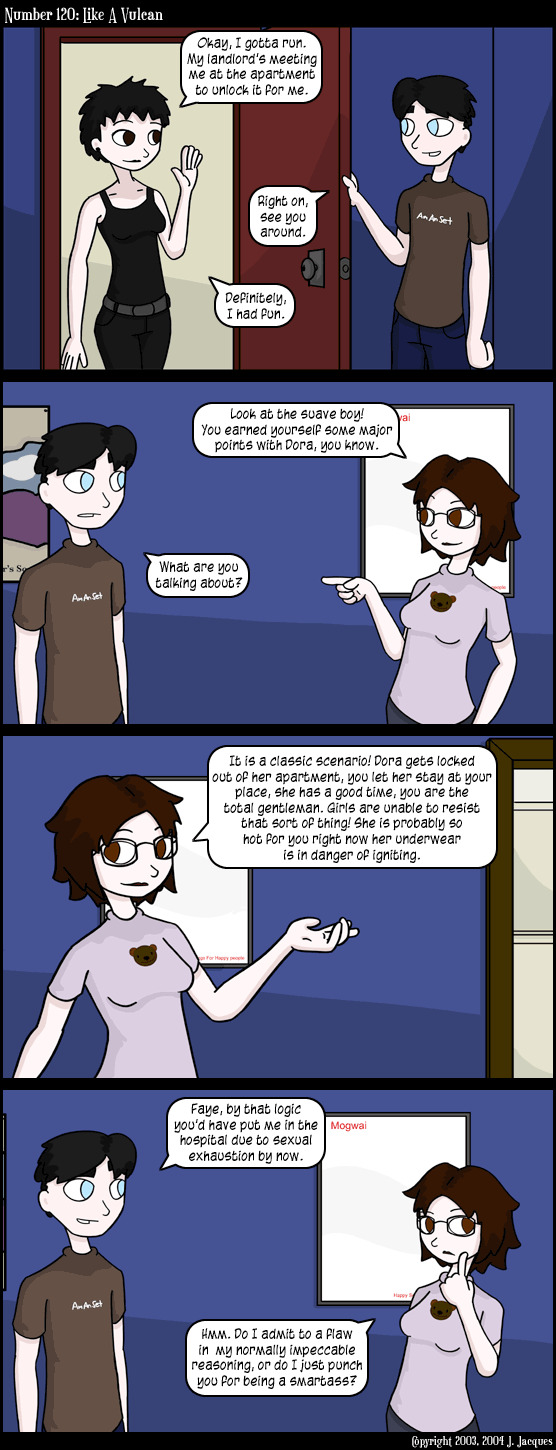
Faye you’re really not helping your case right now. Although it is interesting how hard Faye is showcases how into him Dora is, considering she has her own feelings for him and I highly doubt she’d be 100% cool with the two of them going off to make out.

So here we establish Anthro PCs relationships with humans – namely, they’re basically glorified pets. Pets that have human-level sapience. Don’t worry, Jeph comes to understand the unfortunate implications of this as well, and he goes on to change this in future comics. And by “change this” I mean “completely re-incorporate how AI works in this universe and establish QC as a near-future sci-fi setting.” But that’s not going to be for quite some time. For now, despite my poking fun at the horrific implications here, Jeph’s doing a good job taking the “funny robot sidekick” that’s supposed to be in every webcomic and creating proper lore behind it, making it feel like it belongs in this world rather than be used as a comic relief character and only a comic relief character.
Granted the Anthro PCs as a collective are going to be used as just comic relief right now but, y’know. Baby steps.
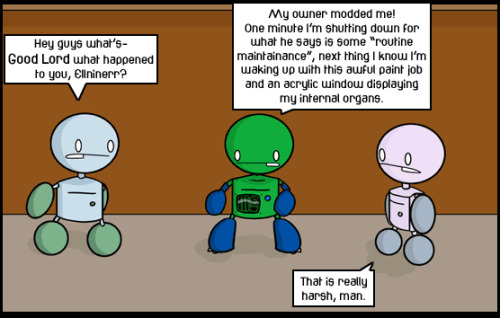
As said before, the fact that these guys are all fully sapient creatures makes the implications of this downright horrific. Also, that’s Ell. I have no idea if he ever comes back – I don’t remember him coming back at all – but I’m marking him down in the character statistics because he’s named.

This… actually has some interesting implications. Marten mentions needing Steve’s help with a date “the other day.” Does that mean he and Faye have known each other for an extremely short period of time? I highly doubt it, we’ve seen a number of times the time has moved from day to night, and the comic itself certainly implies at least a few weeks have passed. So unless by “the other day” Marten means “a month ago” then Marten has been dating women on the side while Faye’s been staying with him. That… seems extremely out of character for him considering the circumstances we’ve seen established in the comic thus far. Considering nothing else really comes from it and the fact if Marten was dating anyone on the side it would definitely be Dora, I’m going to go on the assumption Jeph simply made a mistake here and meant to say Marten was seeing someone a month or a few months back.
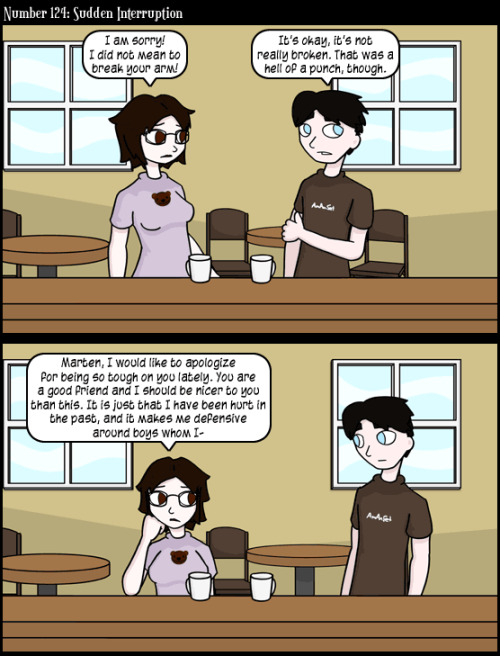
She’s cut off by Pintsize’s destructive laser that he’s using to assert himself as King among the Anthro PCs, don’t worry about it. What we should focus on instead is… well, this second panel here. On paper, this is really good. We’re getting some insight to Faye’s character here, the cracks in her mask are showing. We’re addressing the issue of her assaulting her friend and roommate, what she thinks about it, her current mindset and addressing that this is an actual problem. She’s openly apologizing, sincere in her conviction and clearly wants to fix things.
The problem with this is of course the fact that this is rushed as fuck.
Part of this, of course, has to be the fact that Jeph’s comic by nature is married to the structure of a four-panel comic. We have to set up Faye’s conversation, allow her to continue, but due to narrative convenience she needs to be cut off before she can finish what she’s saying. So the laser cuts her off and after the panel of action, we follow-up and end with the punchline of Pintsize having been made King among the Anthro PCs. And I get it – interrupt Faye before she can finish so you can keep the romantic ambiguity of “boys whom I…” Classic RomCom stuff. Problem is, this isn’t the time or place to do it. Keeping to the structure traps them into a situation where unfortunately Faye doesn’t have the breathing room to stretch this out and make it feel natural. This feels contrived from every angle and every sense of the word.
Easy way to fix this: Have this conversation take place while they’re walking home. Establish she feels bad, have her bounce off Marten and have this conversation naturally. Then either you can have Pintsize cut her off at the end there or maybe even she stops herself when she realizes she’s saying too much. There are ways to make this feel natural. This isn’t natural. Still, credit where it’s due, they’re at least touching on this topic here. Part of me wonders if Jeph had, like, a mental map of where he wanted Faye’s character to go but because he writes these page-by-page it ended up stumbling along and falling flat. A written outline of events can, and does, REALLY help in situations like this.
Then again I’m giving writing advice to a version of someone who existed fifteen years ago. I’m sure he’s got this all down himself nowadays, right?

Payoff to the previous comic.
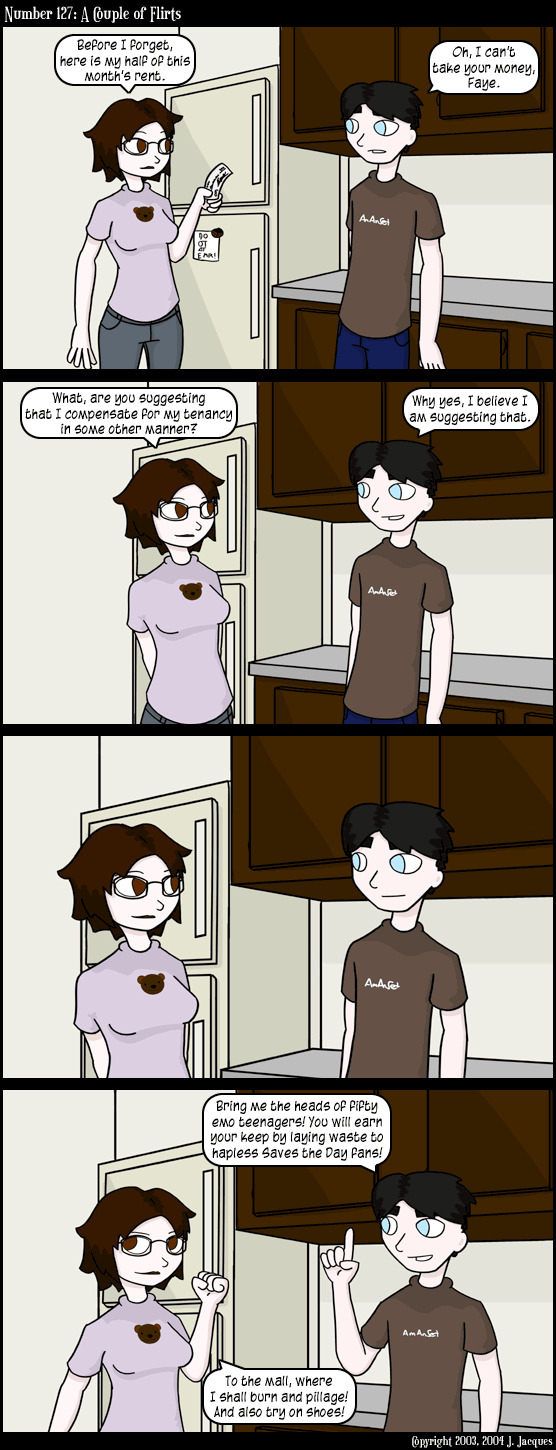
Not only does this crack me up every time I read it, it also shows that Faye and Marten have gotten onto the same wavelength of humor. They’re also comfortable enough with each other that they can imply for a moment sexual favors before completely derailing the implication with the absurd. This is a far-cry from when Faye was trying to burn Marten with her mind back when Pintsize merely implied the two of them share a bed with each other.
Granted, it does kind of fly in the face of Faye’s reaction back at the LANPark. Still, good moment.
Speaking of Faye’s character…

Here we have Faye’s explanation for why she hides her southern accent. Makes sense.

And here, her explanation as to why she doesn’t use contractions… I’ve already said my piece on why I feel this makes zero sense, let’s move on.
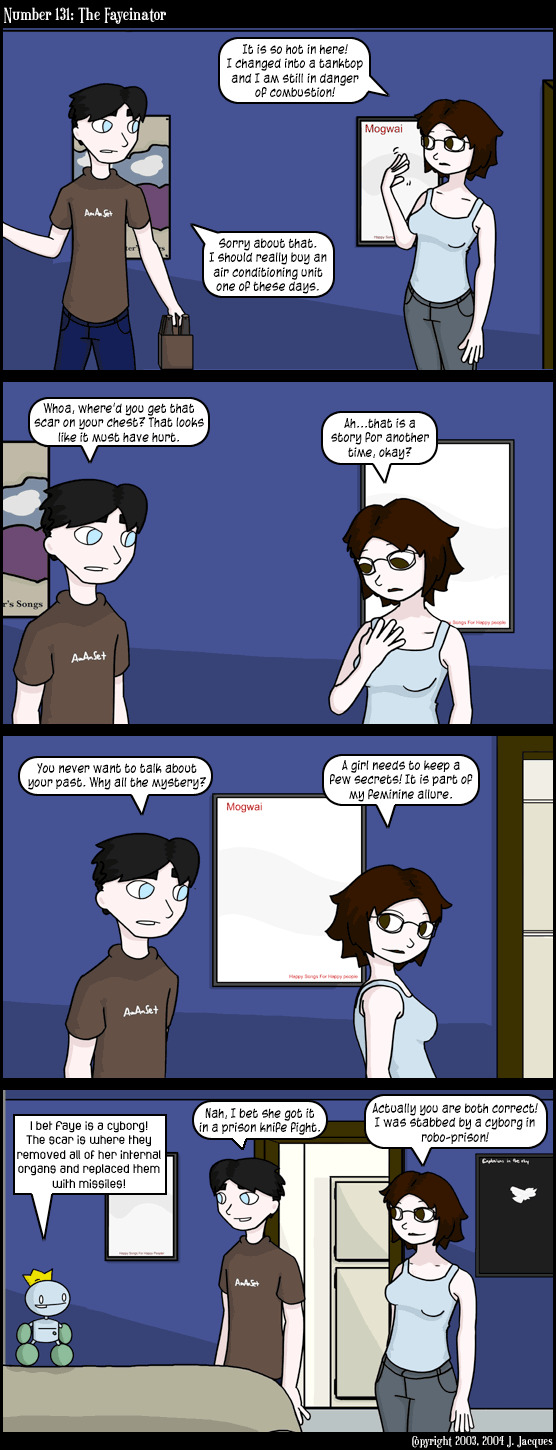
And here we properly draw attention to Faye’s scar and establish the fact that her scar is a sore spot for her… was that a pun? It felt like a pun. Anyway, more and more it’s becoming clear that despite her outgoing nature, Faye has a LOT she keeps close to her chest.
Okay now I know that one was a pun, I’m sorry.
Point being, there’s a lot to Faye’s character we haven’t found out yet, plenty yet to explore in future comics. And I’d also like to point out, this? This is an extremely natural way to establish things about Faye, right here. This feels like something that would actually come up in a conversation rather than planted there for the sake of the audience, and I appreciate that. That said, this in conjunction with the last few moments makes this feel more like it’s time for Jeph to introduce and explain aspects of Faye’s character all at once, which deters a little bit from the natural feeling of this moment in particular. Or maybe I’m just being pedantic, I dunno. In a bubble, this comic works.
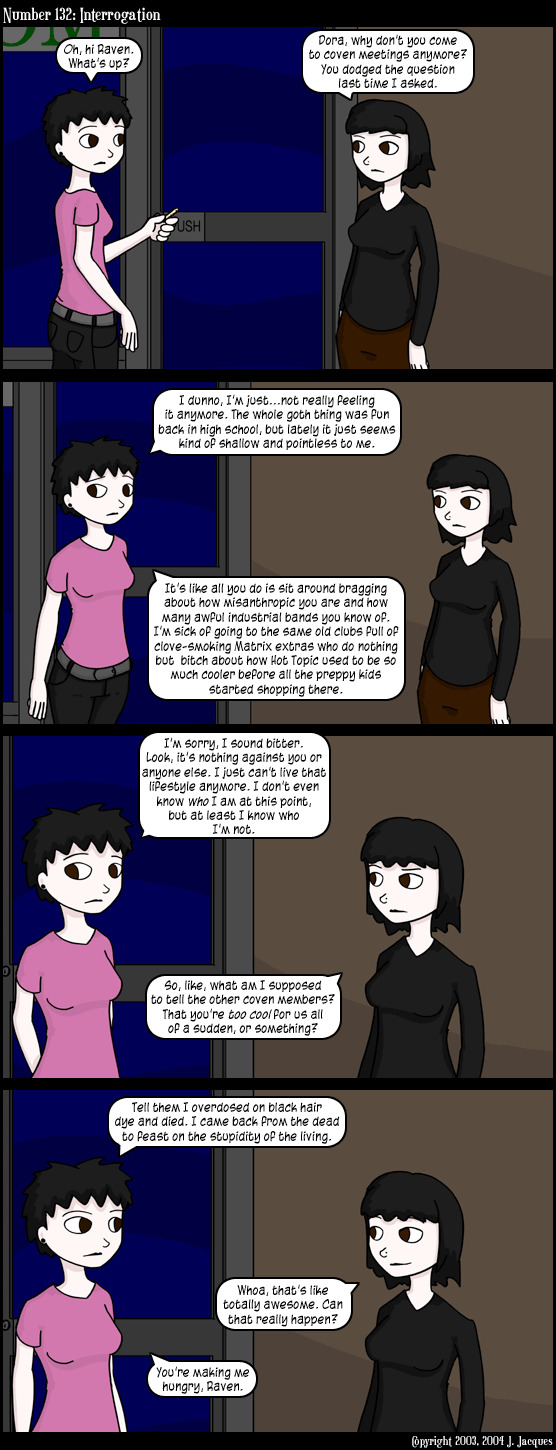
And here we get a flash of the personality we’ll see in Raven in the future. Just a spark though, the flame hasn’t risen up quite yet. Also a little detail about Dora that… again, doesn’t quite make sense given the timescale Jeph has established. I’ll touch on it later in this post when we find out exactly how old Dora is.

This… is an aspect of Marten’s personality that we never really touch on. Actually, this kind of goes toe-in-toe with his interest in Final Fantasy. Is Marten a fantasy buff? Does he enjoy escapist literature and media? Would he be super into Game of Thrones when it comes out as a series? These are questions that… unfortunately, don’t really get answered. I don’t know, I feel like these aspects of who Marten is ends up getting forgotten on the cutting room floor later on in the comic. Maybe they were only included as an off-handed joke, maybe Marten just developed as a character differently than what Jeph originally envisioned him as. Either way, these are parts of him that I think would be wonderful to bring back, especially with his current job and relationship in present-day coics.
Again, like a LOT of things I’m bringing up, we’ll get to that later.
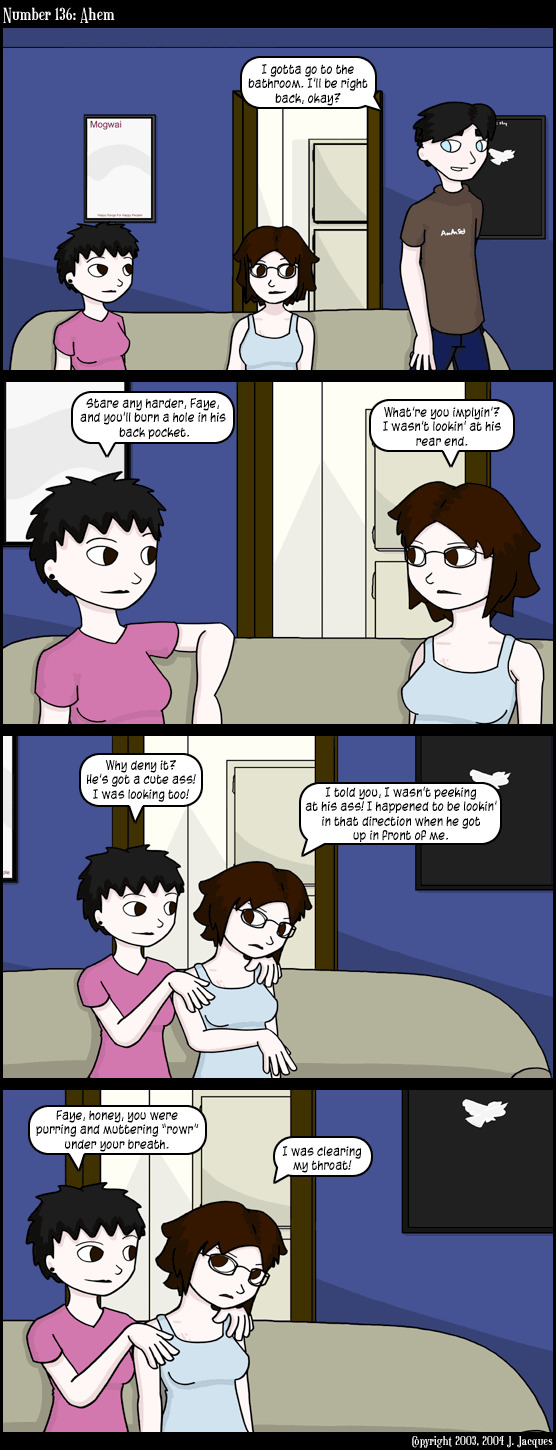
In case you forgot that Faye is genuinely interested in Marten, a reminder and an assertion: She isn’t just interested in the skinny boy. She’s got it bad for him.

But, like a lot of things involving her personal life and feelings, she openly refutes them – not just to Dora but to herself.
Having gone out to give Dora a new look and indoctrinate her into the Cult of Hipster, Dora McPalerThanWhiteBread ends up sunburnt. Marten’s home, he has the lotion, we all know where this is going.
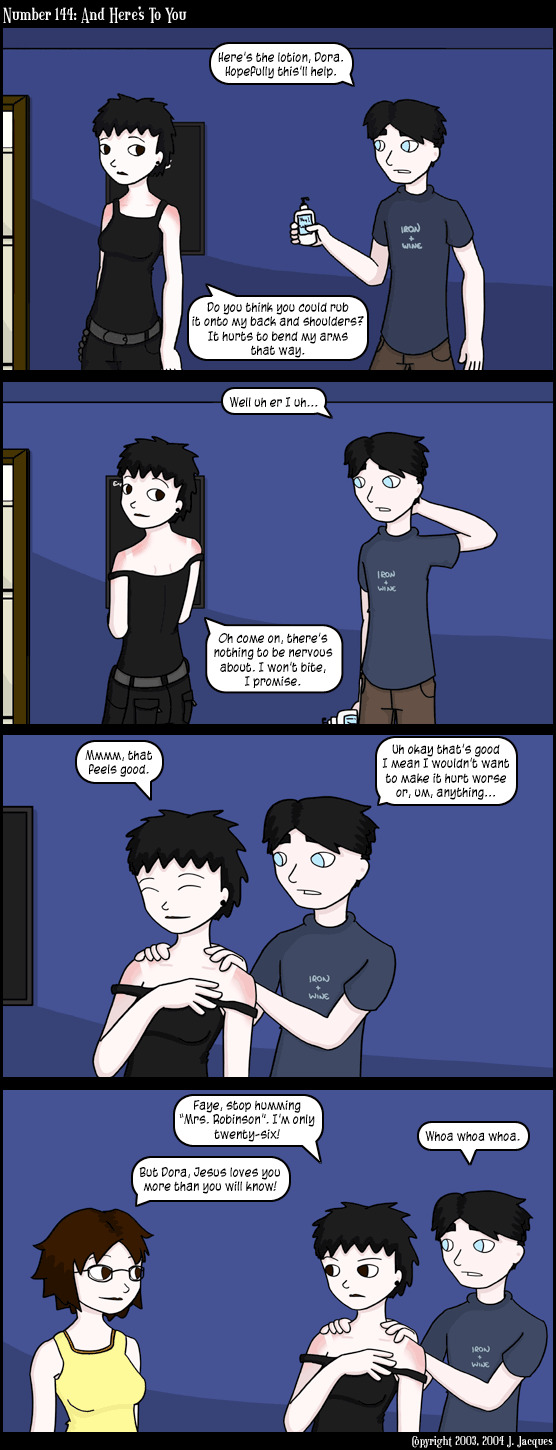
Heaven holds a place for those who pray… I wanted to follow this up with a clip of Sonic from Tails’ story in Sonic Adventure saying “hey hey hey” but surprisingly enough, that particular soundbite isn’t available anywhere. There are plenty of Let’s Plays that poke fun at it, but nothing with that line in particular.
Anyway, let’s talk about time frames. Dora said she got into the whole goth and coven stuff in High School and only now gotten bored of it. She’s 26. Let’s be EXTRA generous and assume she got into it in Senior Year, and she graduated at 18. That’s eight years this has been her life style, almost a third of her life. This wasn’t a phase, this was a genuine life style choice. Either Jeph got the timing wrong, or this is genuinely an identity crisis on Dora’s part because seriously, when something’s been a part of your life for so long I don’t blame you for not knowing where to go from there. I’m just surprised it took 8+ years for her to get sick of it. Then again, maybe that’s normal. I dunno, you can tell me if that’s a normal human thing. I’m literally autistic so I genuinely don’t know.

Setup… and also begging the question why you would give a libido to an AI, or how one would develop it naturally seeing as robots are incapable of sexual reproduction.

I haven’t really mentioned it until now, but Dora’s like aggressively bi. I can dig it. Guys and gals are both pretty in their own ways.

Ignore the lack of color for a second, Jeph wrote up this comic when he had like zero time and couldn’t color it in before he uploaded. Again, we have the HINT of something that Faye’s on the cusp of admitting that says more about her character only to be cut off once again. This feels a bit more natural than the situation at the LANPark. Still contrived by nature of Jeph introducing a conflict to purposefully cut her off, but an understandable narrative contrivance.
Also, remember when I mentioned the joke about the government level laser would come back as an actual plot point? Did you think I was joking? No, here we have Agent Turing (I can’t tell if that’s clever or if I should roll my eyes at this) here to take Pintsize in, dismantle him and take the dangerous laser back.
Faye takes it well.
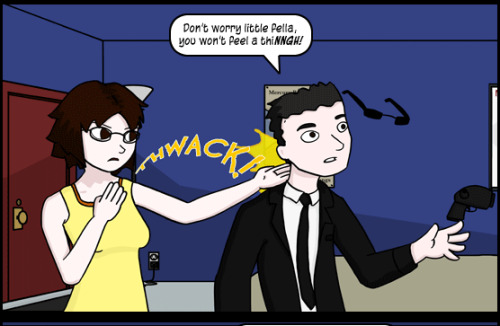
Can you guess what consequences she suffers from assaulting a government agent? I’ll give you a hint – it’s about the same as the consequences she suffered from burning down an apartment.

Payoff.
And finally, we round off this batch of comics with Faye’s expert lying skills to fool Agent Turing…

Ah yes. The ever-deadly Space Owls. Not nearly as scary as Space Bears, though! They’re horrifying!
…not buying it? Yeah neither did my professors back in college.
As per usual, let’s compare a panel from the first and last comics in the batch to see how Jeph’s art style has improved.
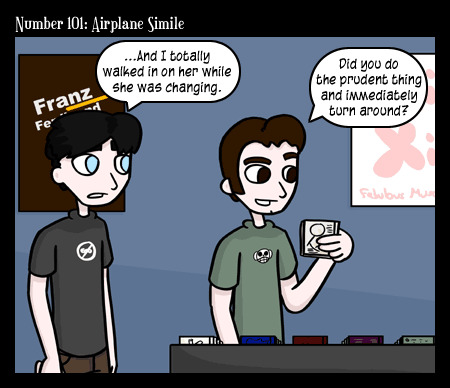

It looks like he’s trying to get the proportions more… realistic? They’ve moved from “cartoons” to “cartoon versions of actual people” and it’s… eh, alright I guess? Personally I’m more of a fan of the more cartoon-ish style in the beginning of this batch, but beauty and eyes of beholders and all.
So overall, what did I think of this batch of comics? Personally, I think the humor is improving dramatically, this batch had the most comics that had me laughing aloud so far. And bringing Dora further into the limelight was a smart move on Jeph’s part – she’s just so likable, I want to see more of her. But as for the inter-personal conflicts… eh? It feels weaker than last batch. More is happening, progress is being made, but it feels… contrived. Artificial. It was the worst in the LANPark, but because that drew my eye I kept seeing every other piece of exposition as just that – exposition. Maybe I’m biased, I’ll fully admit that. I’ll also admit that the bit about Faye’s chest-scar was a well done piece of exposition without feeling like exposition.
I’ve said exposition way too much now, let’s move onto the stats (and for the record, Scarlet Manuka on the QC forums was kind enough to remind me that the name of Dora’s cat is Miéville, so while we haven’t been introduced to that name yet I’ll be using that in my stats from this point forward because it’s better than “Dora’s Cat”).
Faye: 47/50 – 94%
Marten: 41/50 – 82%
Dora: 31/50 – 62%
Pintsize: 18/50 – 36%
Turing: 3/50 – 6%
Steve: 2/50 – 4%
Raven: 2/50 – 4%
Ell: 1/50 – 2%
Grand Total:
Marten: 132/150 – 88%
Faye: 130/150 – 86.7%
Pintsize: 45/150 – 30%
Dora: 39/150 – 26%
Steve: 16/150 – 10.7%
Sara: 7/150 – 4.7%
Raven: 3/150 – 2%
Turing: 3/150 – 2%
Jim: 2/150 – 1.3%
Scott: 2/150 – 1.3%
Miéville: 1/150 – 0.7%
Ell: 1/150 – 0.7%
Faye is climbing up the ranks and getting closer to perfectly equal screentime with Marten across the whole series. Speaking of Faye, in this batch she pulled into first as the character in the most comics, the first time she’s been in more than Marten since the beginning. And Dora’s been in so many this last batch, she jumped up to fourth-most reoccurring character juuust behind Pintsize.
I’ll catch you next week for the epic conclusion to the Pintsize laser saga! And yet more insight on Faye’s past – hope you like ice cream! See you then.
8 notes
·
View notes
Text
The Black Gate Bonus: The Books of Britannia
One of many in-game books that make in-jokes and build lore.
I’d have to look through my notes to see what game first offered full-text books–not as plot devices but just as random background flavor and world-building. It might have been Ultima VI. But even if they appeared in earlier games, Ultima VII is the first game to treat them this extensively, with at least a couple of dozen different titles found on desks, nightstands, and bookcases throughout the homes and workplaces of the Britannian people. The castle alone had more than 15 different books.
Ultima VII admittedly doesn’t do as well with its books as many later titles. Many of them are goofy, or simply analogues of real-world titles, and not the world-building tomes that we find in, say, The Elder Scrolls series, the Infinity Engine games, or The Witcher series. Still, they’re fun and deserve some additional attention and analysis.
I thought I’d use this entry to organize that analysis, adding new books as I find them. I’m excluding some “plot” books that don’t have much text (like Morfin’s register of venom sales). I’ll add notes to future entries when this one has been updated. The books I’ve found so far are:
The Apothecary’s Desk Reference by Fetoau. A book that accurately describes which potions have which effects. Very useful.
The Art of the Field Dressing by Creston, with a forward by Lady Leigh. It has some advice about cutting cloth into strips to bandage wounds, something that actually works in the game. While Lady Leigh is later found in the game, I don’t believe Creston is.
The Bioparaphysics of the Healing Arts by Lady Leigh. The bible for in-game healers. I believe Lady Leigh will be found later in Serpent’s Hold.
The Book of the Fellowship by Batlin of Britain. The first page of the game manual–the one time it makes sense for a real-life book to appear in the game.
Chicken Raising by Daheness Gon. A relatively useless instruction manual for raising chickens and producing eggs. The anatomical advice seems accurate, but I’m not sure how it helps in-game. Found on the shelf of a farmhouse, which makes sense.
Chitty-Chitty-Bang-Bang by Ian Fleming. The real-life 1964 book by the author better known for creating James Bond. Lead Ultima VII writer Raymond Benson later went on to become the official James Bond writer from 1997-2002.
With a couple of syllabic substitutions, this could easily have been a James Bond title.
Collected Plays by Raymundo. An anthology of plays by the guy who runs the theater in Britain. Play titles include Three on a Codpiece, The Trials of the Avatar, The Plagiarist, Clue, and Thumbs Down. “Raymundo” is the in-game avatar of lead writer Raymond Benson, and at least three of these plays are real plays written by Benson. Clue is a 1977 musical based on the board game–a full 8 years before the Tim Curry film. The Plagiarist and Thumbs Down are more obscure; I’m not sure when or if they were ever staged, but they were published as short stories by Amazon Shorts in 2006. Three on a Codpiece is described in-game as a performance art piece in which audience members “tear an undergarment into tiny pieces, after which they are placed in funeral urns and mixed with wheat paste . . . then the audience may glue the pieces anywhere on [the actor’s] body that they wish.” One Ultima site suggests this might be a reference to Yoko Ono’s Cut Piece (1965).
A Complete Guide to Britannian Minerals, Precious, and Semi-Precious Stones by B. Ledbetter. The book discusses some of Britannia’s natural resources, including veins of gold and lead. It is notable for a paragraph on blackrock, a “recently discovered” substance with little practical use, rumored to have a “profound effect” on magic. This will of course become a major part of the game’s plot. I don’t believe Ledbetter appears in-game. I thought it would be funny if it was the guy who runs the jewelry shop in Britain, but his name is Sean.
The Day It Didn’t Work by R. Allen G. A collection of essays about “overseeing a group of well-meaning misfits in a mechanical environment.” An obvious joke about Richard Allen Garriott and the staff at ORIGIN.
Everything an Avatar Should Know about Sex. This book is blank after the title page. Ho-ho-ho. Or maybe it’s not a joke and it’s foreshadowing the upcoming unicorn encounter.
The Honorable Hound inn register. The guest list for this Trinsic inn has four recent names: Walter of Britain, Jaffe of Yew, Jaana, and Atans of Serpent’s Hold. Jaana is of course the Avatar’s companion going back to Ultima IV. I don’t believe the others are ever seen or heard from in the series.
How to Conquer the World in Three Easy Steps by Maximillian the Amazingly Mean. The ravings of a “megalomaniac cleric.” He plans to acquire VAS CORP (“Mass Kill”), which he thinks will make everyone fear him, and that not even Lord British himself is immune. I’m pretty sure that Lord British survives a VAS CORP (which is a real spell). Lord British doesn’t even die from VAS CORP IN BET MANI (“Armageddon”). Also, there are no “clerics” in this setting. As an aside, I wonder if employees of Vascorp Network Solutions know that to a portion of the public, their name means “Mass Death.”
Hubert’s Hair-Raising Adventure by Bill Peet. A real 1969 children’s book by a real author. It tells in rhyme how the proud lion Hubert had his mane scorched in a series of escalating misadventures. We learned about its presence in Britannia in Ultima VI, where Lord British spent every night reading it to Sherry the Mouse. I don’t know which idea is worse: that the adolescent Lord British was carrying the book while hiking through the English countryside, or that he later went back for it.
It’s good that Lord British has priorities.
Jesse’s Book of Performance Art by Jesse. A “controversial and eccentric Britannian actor” who has published a book of “scripts” for performance artists and argues that performance art is basically the same thing as acting. Jesse is an NPC in Britain who jokes about playing the Avatar and having only three lines: NAME, JOB, and BYE.
Key to the Black Gate. A cluebook to the game, found within the game (but without any of the actual text). Probably meant as a subtle in-game advertisement. Can you imagine needing a cluebook to solve this game?
A crummy commercial?!
Lord British: The Biography of Britannia’s Longtime Ruler by K. Bannos. The biography frankly acknowledges that Lord British is from another world. I wasn’t sure that was public knowledge until now. He entered Britannia through a moongate and became one of the rulers of the eight kingdoms of Sosaria. The people proclaimed them the king after he successfully dealt with Mondain, Minax, and Exodus. The book recounts his role in Ultima IV and Ultima V but ends just as the gargoyles become a threat in Ultima VI. Unfortunately, the text also re-affirms the idea that the Avatar is the same hero as the one who defeated Mondain, Minax, and Exodus–the dumbest retcon ORIGIN ever introduced.,
Part of Lord British’s bio. A party of Fuzzies defeated Exodus and nobody can convince me otherwise.
Mempto Rays: A Qualitative Study in Metaparaphilosophical Radiation by Mempto. Some rantings about Britannia always being bombarded by radiation “lethal to all non-living matter.” Probably meant as a send-up of pseudo-science in the modern world.
No One Leaves by R. Allen G. This sequel to The Day It Didn’t Work is a humorously-phrased paragraph about missed deadlines and forced overtime.
No Way to Jump by Desmonth. A treatise on tropes found in adventure stories. This is probably another in-joke about game development. After all, Ultima VII, for all its realism, does not allow the Avatar to jump. The issue continues into the present day and is found on TV Tropes as “The Insurmountable Waist-Height Fence.” Note that Ultima VIII does feature jumping and jumping puzzles.
On Acting by Laurence Olivier. Philosophical notes on acting “written by a noted thespian of a distant land.” The text notes that it was apparently “one of the many brought to Britannia by Lord British.” Why was the kid hiking with half a library on his back? Anyway, Sir Laurence did in fact publish a book of this title in 1986.
Play Directing: Analysis, Communication, and Style by Francis Hodge. A “respected textbook” written by “an eminent professor emeritus from a university in a distant land.” It is in fact a real-world book, published in 1971 by a professor at the University of Texas at Austin. Probably someone that Raymond Benson or someone on the staff at ORIGIN (which was based in Austin) knew. Hodge passed away in 2008.
The Salty Dog inn register. This inn and tavern in Paws lists seven recent visitors: Addom of Yew, The Avatar, Jalal of Britain, Tim of Yew, Blorn of Vesper, Sir Dupre, and Penelope of Cove. Addom is a traveling merchant who later shows up in Moonglow and plays a role in that city’s plot. To my knowledge, Jalal and Penelope never appear in the game, although I think Jalal appears in another register. Tim of Yew is also an unknown (there was a bard named Tim in Ultima V but he’d be long-dead). Blorn is an anti-Gargish racist who we later find in Vesper. The idea that Dupre recently visited a tavern is entirely within his character. The most disturbing entry is that someone is wandering around passing himself off as “The Avatar.”
Thou Art What Thee Eats by Fordras. A nutritional analysis that pre-dates the Atkins crazy by suggesting meats and vegetables ahead of carbohydrates. The author recommends certain foods in order, and I think it roughly corresponds with how filling those foods are in-game.
The Transitive Vampire by Karen Elizabeth Gordon. This is a real book by a real author, originally published in 1984. As best I can tell, it’s a real book about English grammar and syntax, but all the examples are vampire-themed and there are vampire illustrations. If there’s something deeper going on, someone’s going to have to tell me. I suppose if it actually gets people to read a book on grammar, there are no bad ideas.
Go figure.
Tren I, II, III, IV . . . XVII. An autobiography by “the obtuse mage” which “reveals Tren’s life in all of his incarnations as he continually strove to possess more powerful beings.” As far as I know, we never meet a mage called Tren, nor do we ever see an application of magic that involves possession of beings.
Up Is Out by Goodefellow. A treatise on gravity and mass, including “falling apples.” It’s a clear analogue to Isaac Newton, but I otherwise don’t know if the title and author are a reference to anything. If Goodefellow is an actual Britannian trying to research physics, his life is going to be rough.
Vargaz’s Stories of Legend. This anonymous book is subtitled Reasons Why One Should Never Build Doors Facing North or West. The book has two stories, one about a plague of locusts foretold by Father Antos (Ultima II and IV) which destroyed houses with north-facing doors. The other tale suggests that monsters fleeing sunlight are more likely to flee east and thus invade houses with west-facing doors.
The Wayfarer’s Inn register. This tavern in Britain lists five recent guests: John-Paul of Serpent’s Hold, Horffe of Serpent’s Hold, Featherbank of Moonglow, Tarvis of Buccaneer’s Den, and Shamino. I later found Shamino shacking up with an actress, so he probably only had to stay for one night. I don’t believe Tarvis or Featherbank appear in the game, but John-Paul is in fact the ruler of Serpent’s Hold and Horffe is his Gargish captain of the guard.
What a Fool Believes by P. Nolan. The book only has a brief paragraph, describing it as “the story of a bard, a blonde, and a bottle . . . a classic tale of the war between the sexes.” There’s a song of this name, of course, recorded by the Doobie Brothers and Aretha Franklin among others, but it doesn’t mention a blonde or a bottle and has no association with anyone named “Nolan” (although, in a weird twist, the R&B artist Nolan Porter did cover the song, but not until 2011).
The Wizard of Oz by Frank L. Baum. The real book from the real world, except that in the real world, the author is L. Frank Baum. It is given a quick summary in-game. I assume it’s in Lord British’s castle because I stole it for him as part of an Ultima VI side-quest.
source http://reposts.ciathyza.com/the-black-gate-bonus-the-books-of-britannia/
0 notes
Photo

Bert Huyghe
A long-term thing, at least for the moment.
Nederlandse vertaling
Date of interview: November, 2017
Estimated reading time: 12 minutes
Before visiting his studio, we meet up with Bert Huyghe (°1989, Eeklo) in a Ghentian sandwich parlor, the city being his artistic headquarters since many a year. Apart from the late post-punk band Ping Pong Tactics, the countless releases and booklets, the Geuzenprijs awarded essay The Boxer and his slightly provocative, sometimes hilarious performances, Huyghe especially manifested himself as a painter, producing thickly layered, colorful canvases, instantly recognizable by their smeary charm. With clumsy virtuosity they speak of painting itself, in all it’s treacherous self-evidence. Since 2017, Huyghe is represented by Brussels’ Rossicontemporary, alongside a.o. John Van Oers, Luc Deleu, Lore Stessel and Ritsart Gobyn.
Some time later we find ourselves in the centre of creation. Some recent works are being put up for us: a collection of football shirts, dangling from an imaginary clothesline on the studio wall in a familiar candy and Nickelodeonlike color spectrum. An eclectic mix tape of Bruce Springsteen and trap is stuffed inside the cassette player. Bert talks without uh’s, sometimes thoughtful, then again floating on a linguistic rapid. We’re caught up in a discussion on the social position of the artist. Lots of interesting stuff has already been said and I haven’t even pressed the record button yet.

You could also say that normal life consists of making two thousand euros a month and that art and strange paintings are of no value to society whatsoever.
So Bert, why do you paint football shirts?
Well, because the forms and colors attract me. It’s not about which teams or brands they represent. They are paintings, in the first place. I don’t really want to talk about adidas, or them being a big multinational. I don’t sit at my desk first, trying to decide on whatever good cause I will engage myself for. That’s not my job. Being an artist I’d rather embrace adidas, to examine such a brand visually and show it to the world, on a highly personal level. That’s also taking your responsibility. Because I really am a nineties kid, influenced by sports clothing and television during my very nice childhood. Of course I think one should be critical and reflective. But on the other hand I can’t deny being psyched about a new pair of sneakers. I wonder: how will people look upon those brands in a thousand years? That three-stripe pattern goes back a few generations now. What does that mean for us? To investigate that also means taking one’s responsibility.
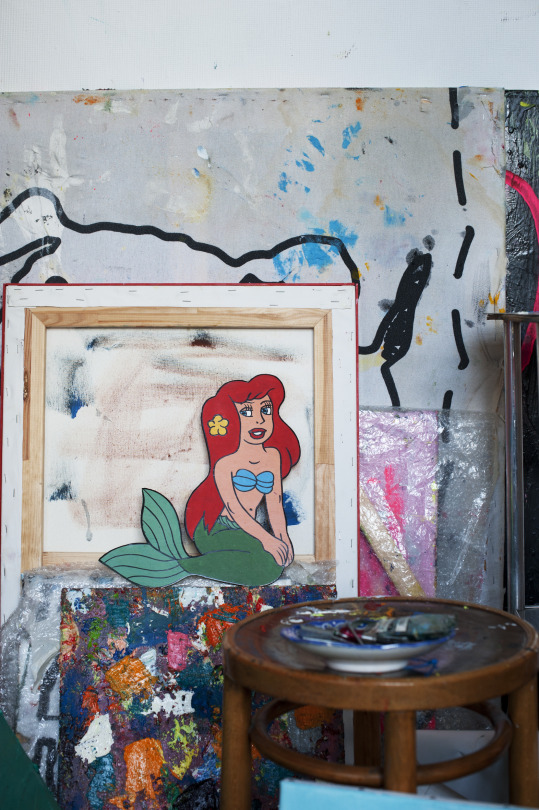
Right now we’re in a peaceful beguinage. To what extend does this environment have an influence on you and your practice?
It’s nice and quiet around here, that’s what I like about it. For me, the studio is a vantagepoint from where I can look at the world, while it’s turning upside down. You could also say that normal life consists of making two thousand euro a month and that art and strange paintings are of no value to society whatsoever. But the opposite is true: the studio is the only place of value and normality. To get back to that social aspect: I don’t think Guston painting Ku Klux Klan figures should exclusively be understood as a political statement, I presume he also did it just because he felt like painting funny shoes, or because he liked to use the color pink, or because he loved comics. Researching a medium and the world outside and what that means for you as a person, can’t be separated. You always tell something about what surrounds you. Each medium offers it’s own set of tools for doing that.
You played in a band for many years. What place does music have in your visual practice?
Music was and still is very important. I also believe Ping Pong Tactics was all about finding an honest sound. At first we where booed at for sucking at guitar - given the fact that none of us had any musical training - or for wanting to make beautiful pop songs but singing them terribly out of tune. But in doing so, we created a ground zero from which we could start all over, rather like an existentialist approach to making music. Everything’s possible, everything’s permitted, what will happen if we utilize that freedom? I also see the anachronism of that attitude. Our songs had a nostalgic touch to them, often referring to our childhood, the rural environment we grew up in. That’s also why we split up: because we outgrew it all, I guess.

Everything’s possible, everything’s permitted, what will happen if we utilize that freedom? I also see the anachronism in that attitude.

Do you miss it?
I miss the physical aspect of making music, as one can also miss the physical aspect of playing football. You should always, at a certain moment, be able to stop any collaboration. However much there is to be learned, there’s always that danger of becoming each other’s clone. Then you know the time has come for finding your own voice again.
(pauses)
To maybe answer your question: a certain childishness is also present in my paintings. It’s about therapeutically approaching my youth, I guess. Therapy is an important function of art. For the record: I did have a very nice childhood. Maybe this also makes the studio into a place of freedom, a space where you can be more like a child. At the same time, my ten-year-old self would probably say that I could make much nicer drawings than these. Thanks to the fact there really wasn’t any art where I grew up, I could approach things with an open mind once I got a little older. I often entered the room doing something that had been done a hundred times before, but just a little louder. Half the people liked it, the other half turned their backs. I didn’t really mind.

It’s about therapeutically approaching my youth, I guess. Therapy is an important function of art. For the record: I did have a very nice childhood.

Do you care about what people think of your work?
Look, I’m very glad Rossi(contemporary, red.) represents me, for example, and that they really believe in what I’m doing. This gives me time and space to seriously work towards a goal, to really accomplish something. Of course everybody sees something different in my work. When they identify themselves with themes like childhood, football or the Simpsons, that’s just great. When they think I captured an aspect of our generation, I even take that as a compliment. But the last thing I want to do is to impose an interpretation on anyone. You know, lot’s of people come in here and ask how a certain painting was made: what’s beneath this, why’s that stain there… You’re asking questions about artistry in general, social themes and such. That’s fine by me. You do your job and I’ll do mine. A child also just likes to show it’s drawing, I guess. Of course we can’t compare how a child experiences art to how an adult does. Those are two completely different things. There’s that certain cartoonish jest that I’m sampling as an adult, but in the meantime I’m really looking for a way to paint like only an adult can. I think that’s a very serious job. I believe that doing something silly in a serious way is a lot more important than … doing something silly in a silly way. (laughs)
Of course you owe a lot to history and previous generations, and this may sometimes feel like a burden. But by now I’ve distanced myself from considering Walter Swennen my dad or anything like that.
Is it still relevant to be authentic, to create something original?
I for one believe I simply am my work. I don’t really care about who’s copying what or whatever. Of course you owe a lot to history and previous generations, and this may sometimes feel like a burden. But by now I’ve distanced myself from considering Walter Swennen my dad or anything like that. However interesting I may find his work. I also learned his generation looks at the world a lot differently than ours. You see, whenever you are something, you don’t really give it a second thought. It’s just who you are, at any given moment. That’s why I don’t regret anything, artistically speaking. I do regret buying a certain sandwich, but not my art. Even bad decisions are good, if there’s something to be learned from them. I’d rather focus on the ideas still ahead of me, instead of the ones I already had. I look upon all of this as a journey that will last until I’m an old man. That’s my greatest ambition, to do this forever.

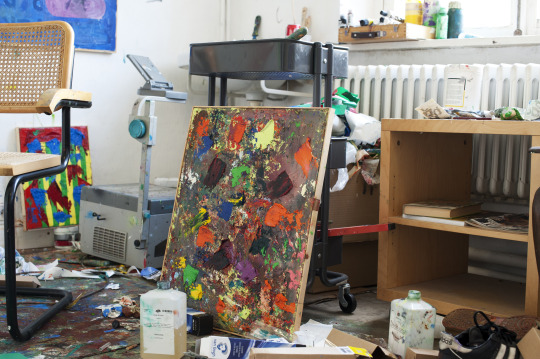
I believe that doing something silly in a serious way is a lot more important than … doing something silly in a silly way. (laughs)
You are known to produce a lot of releases and editions, be it independently or not. May we expect anything soon?
My most recent booklets or ep’s where the result of a more intense process. This felt more to the point, in a way. Like you said, my production flow used to be a lot bigger. People like Gerard Herman also taught me a lot about releases and graphics. But here again, I currently look upon myself as a painter. It’s just what consumes all of my energy right now.
I guess something important has changed in that respect. Look, this might be interesting to show you guys (takes a big painting, puts it on the wall). I call this one my Cy Twombly. I still like Twombly’s work a lot, by the way. While I was making it, I tried very much to paint in a poetic, intuitive manner. Stuff accidentally falling on the canvas, drippings, stains ... You know, right. That way it almost turned into a beautiful abstract. Something in me resisted right away. I felt like that country boy again, not fitting in with all that prettiness. So the next thing I did was put on my name in big letters. At the same time, I also couldn’t make it into a purely conceptual painting: a white canvas with my name clearly printed out. Both attitudes are in perpetual collision. I was inconsistent, which is very important for an artist. Lately I tend to lean more towards the calculated approach because I’m making a series now. I believe it’s a long-term thing, at least for the moment. In that sense my work isn’t much like Swennen’s anymore. I can’t imagine him ever making a series.

As you’ve probably noticed, some time ago it was very hip to paint these meaningless abstracts with clumsy frames around them. But the fact that it’s a gimmick doesn’t mean I’m forbidden to do it also.

You’re working on landscapes now: a classic theme within painting. Is that part of the change you mentioned?
You know why I’m doing that? Because my grandmother once asked me when I would finally paint a landscape (laughs). My interest for The Simpsons and cartoons in general, from which I derive them, was already present. It’s just a nice coincidence that this connects to art-history. You know, we used to live in a beautiful rural area called Sint Laureins and this influenced me a great deal, but nature and landscapes we mostly just experienced like all kids do: within the artificial frame of a television set. No doubt I owe a lot to the canon. The Simpsons and football are also part of that canon, by the way. The bright colors of football shirts positioned on a pitch, the way they contrast one another: that’s painting in real life. It’s part of what attracts me in that sport. I could only find that out by intensively making lots of paintings. Constructivism was also influenced by sporting outfits, I’ve heard.
(pauses)
Actually, it’s all about painting. Everything else is just an excuse. How a painting is made, that’s what I find most important. The way I paint it, how that sets me apart from other artists. As you’ve probably noticed, some time ago it was very hip to paint these meaningless abstracts with clumsy frames around them. But the fact that it’s a gimmick doesn’t mean I’m forbidden to do it also. It’s about making an interesting image. Do I remove the black lines from a cartoon? Yes? So, why am I doing this then? Because it leaves me with plains of color, interacting with one another. That’s when it becomes a painting. Everybody thinks Lichtenstein just painted comics, for example. That’s not entirely true: he really selected those images, altered them, fixed the composition. All until they spoke as paintings, until only the right tension remained. I never dislike something somebody else has made, by the way. Worst-case scenario it’s just boring.
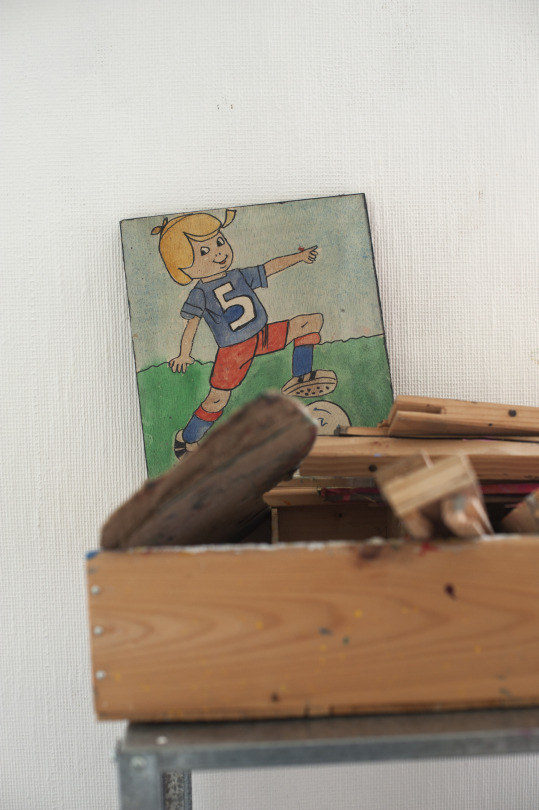
That’s the most profound quality of paintings: them being physical objects. You can just watch them as an accumulation of paint, a collection of colors. It’s a residue of an act.
Do you watch The Simpsons waiting for the right still? Or how do you start a painting like that?
No, I select images from the hundreds of interesting blogs exclusively occupying themselves with collecting Simpson’s screenshots. In that sense my method of image hunting is very contemporary. But that’s not what my work is about. I don’t really believe in the influence of, let’s say, social media on my work. I think people are still very much analogue beings. Internet and social media are just practical tools as far as I am concerned. That’s the most profound quality of paintings: them being physical objects. You can just watch them as an accumulation of paint, a collection of colors. It’s a residue of an act. To understand this, you don’t have to have any connotations. I believe, that as long as it’s good, it’ll float like oil. I don’t want to make a puzzle that has to be solved or anything. Some people like that about art, when there’s a solution. But that one solution doesn’t exist, if you ask me.
Interview and English text: Maxim Ryckaerts
English editing: Maia Daley
Photography: Sanne Delcroix
www.berthuyghe.be

_
0 notes
Text
Analyzing Questionable Content: Pages 201-250
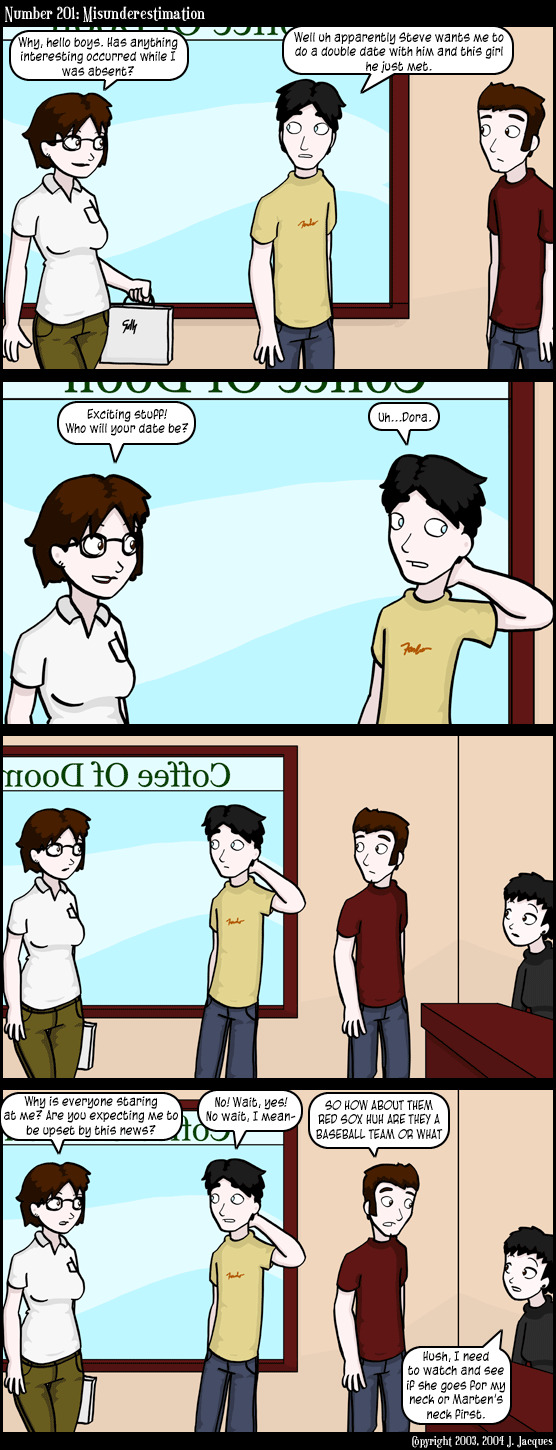
Marten’s closer, Dora. Of course she’d go for his first.
Okay, I’m just going to be upfront and honest with you guys. I’m just really not feeling it for this batch of comics, and that’s part of the reason why I had taken the previous week off. That’s not to say this batch is bad or anything, it’s just... I feel like I have a lot less to say about it than I should. So I apologize ahead of time if this feels too short or if it’s much more dull than usual. I’ll try hitting the high points and give you the proper character analysis I can muster here - the fact that what you see right now, with Marten and Dora going on a date and Faye’s reaction to it, will provide quite a deal of character insight.
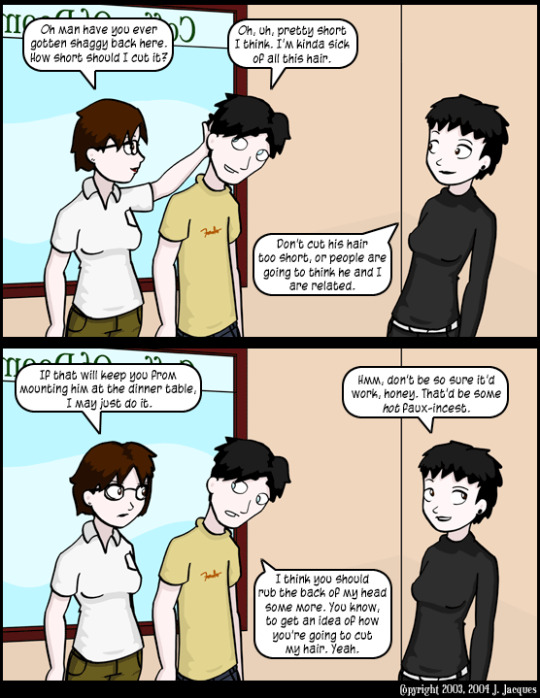
For example, right here. Not even a single page later and Faye’s genuine irritation over the situation is showing, despite what she has to say about the situation.
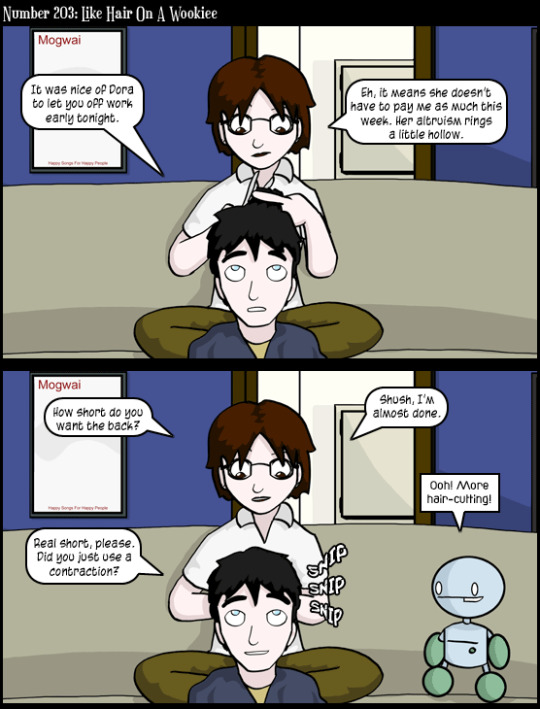
Ignoring for the moment the stupid contraction thing (which, if memory serves, will thankfully be dropped after this batch of comics), do Faye’s eyes look... different to you guys? I don’t know, it feels like Jeph’s making an attempt at a slight tweak in his style here and I mostly notice it in Faye’s eyes. I could be looking way too deep into it though, I’m willing to accept that.
They have some light banter, part of which includes Faye continuing to press on the fact that Dora is hyper-sexual and will jump Marten’s bones the second she gets the chance, Faye goes on and continues her nice streak with Marten by offering to make him dinner. Now, I could take this time to point out the obvious, that Faye is clearly doing this much for him not just out of a sense of guilt over how she’s treated him but also bolstered by the fact that, even if subconsciously, she does NOT want Marten to be with another woman and is vying to keep his attention on her... But Faye doesn’t give us a chance to ponder that for very long.
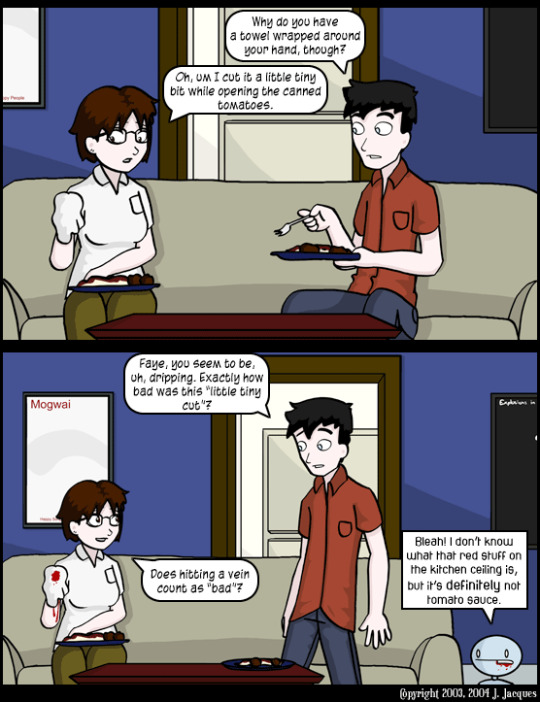
I don’t blame her, the rims of cans are fucking horrifying. Not as bad as the edges of an outlet box, but thin slices of metal ain’t fun let me tell you.
Despite this, there’s really not much to say about the outcome - we learn that Faye’s last name is Whitaker and that this city has a “punching intern” for the local hospital.
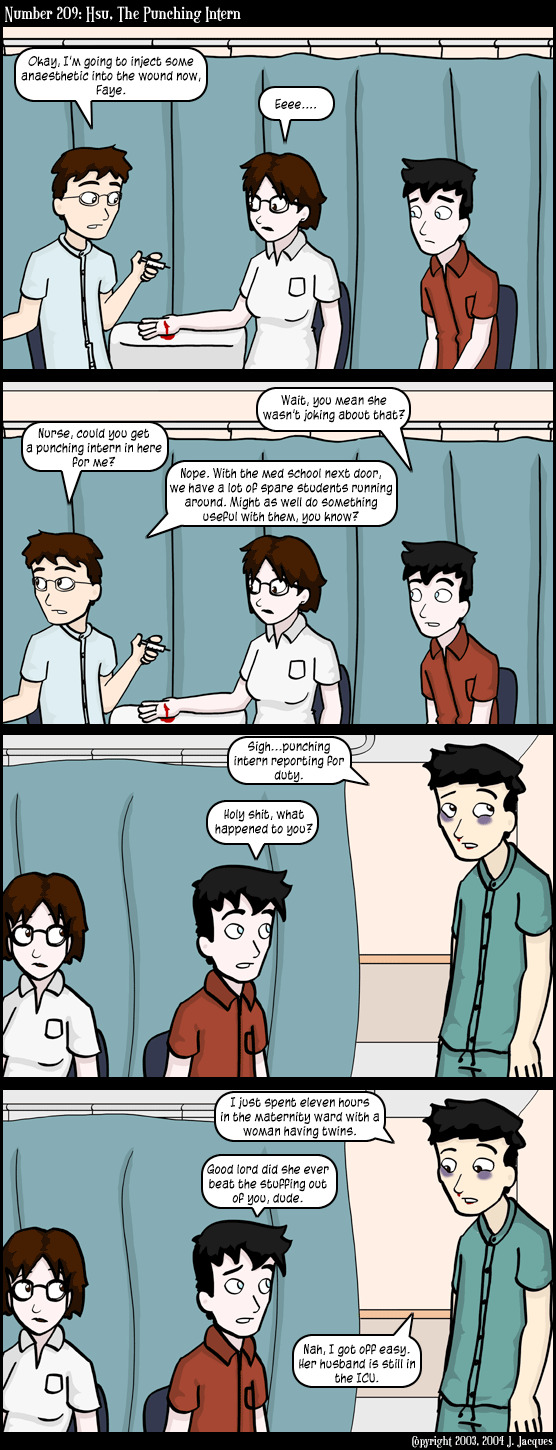
That... can NOT be legal. Then again, if this city held itself to any standards of legality I’m certain the Irony Cafe would be closed already due to false advertising. Plus, this is taking place in America and Faye isn’t freaking out more about not being able to afford the hospital bills than the fact she was injured, so maybe that’s the trade-off to having a halfway decent medical facility.
Oh, and when everyone gets back home, we get a bit more insight into the mechanics of Pintsize.
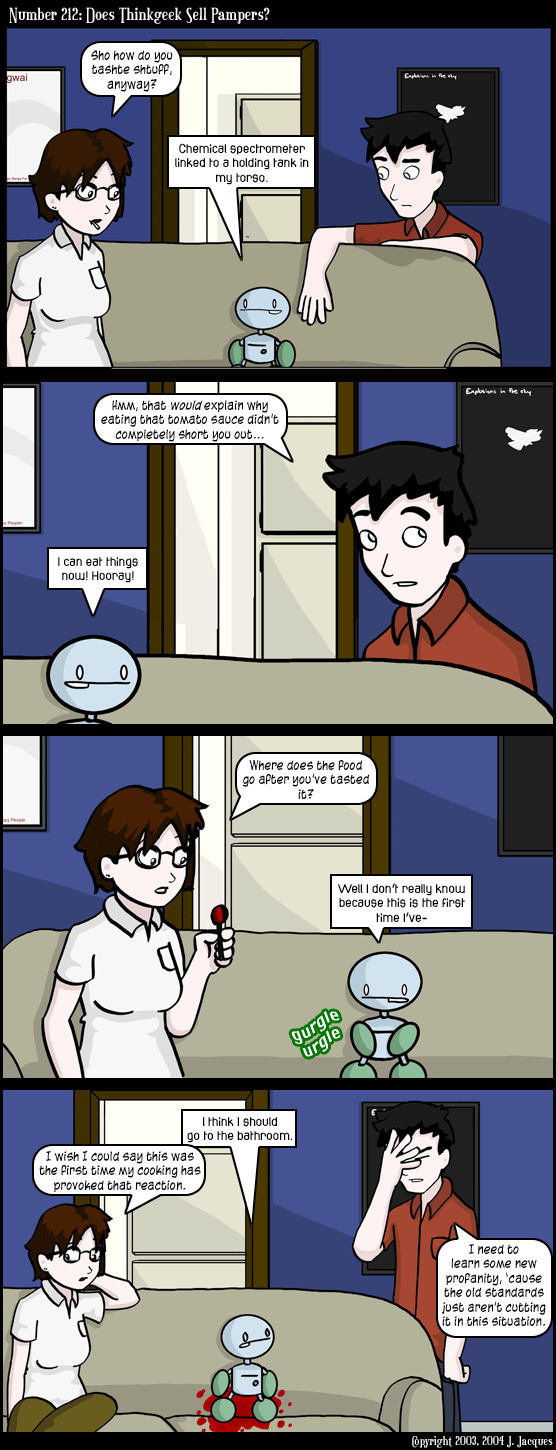
That raises some questions. If this is unique to this particular platform Pintsize’s AI is housed in, how was he able to taste the cake mix in his previous body? If this is universal between Anthro PCs, then why didn’t Marten already know this if he’s been with Pintsize as long as has been implied thus far? I mean I get it, Jeph’s using this as an outlet to create some lore behind the funny robot people in his comic’s universe, but... I dunno, it just feels like this makes Marten seem more incompetent than anything if he didn’t know this about his own Anthro PC. Maybe if he helped explain it alongside Pintsize to Faye to showcase that he knew about this as well? I dunno.
The next day, Steve gives Marten a call:
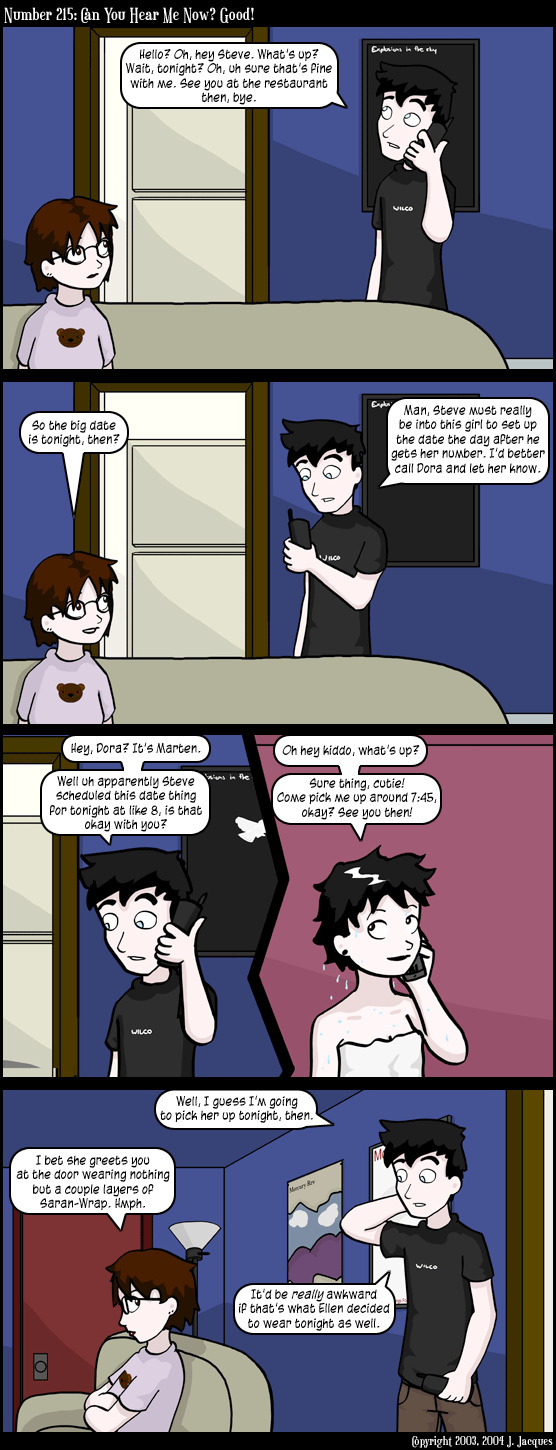
Faye, your irritation over the situation isn’t exactly subtle. Also I’ve said it before but I’ll keep saying it - sarcastic Marten is best Marten. I like this Marten a lot.
And so, as a wise Skeleton once said... DATE: START!
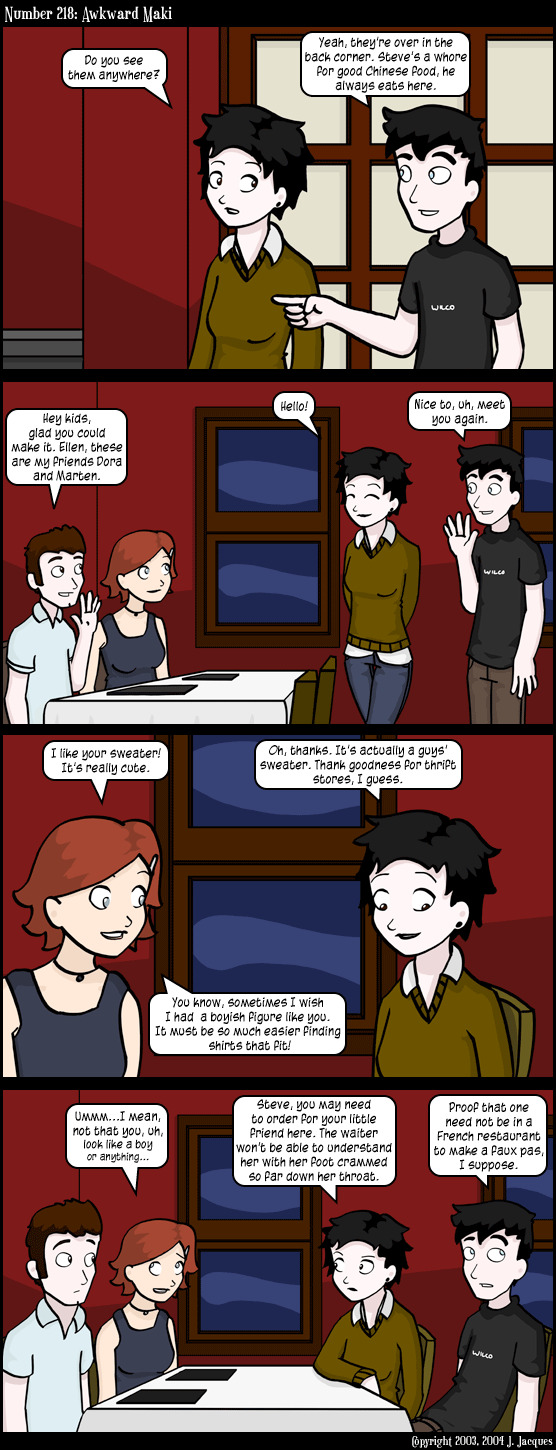
We’re already off to an amazing start with Ellen kicking off! And, oooh, it looks like she tripped and injured herself in the initial play! Can she recover, folks? Well before we find out, we have another comic involving a drastic art shift deliberately invoked from Jeph:
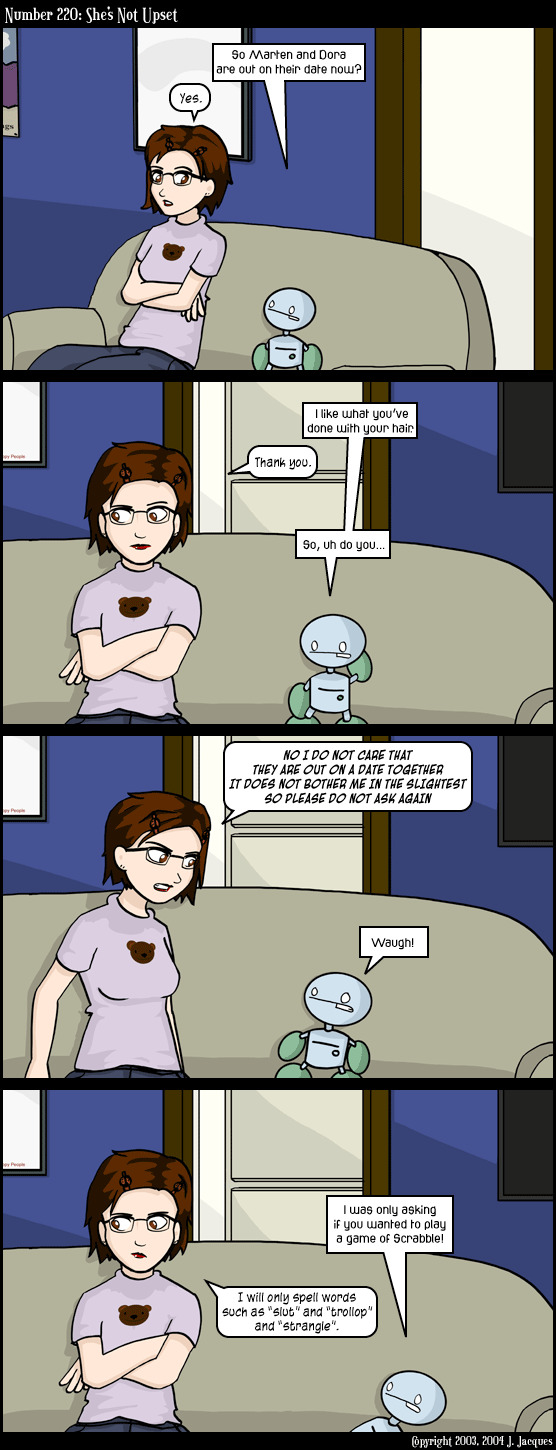
youtube
In all seriousness, the art shift isn’t... bad, per-se, it just looks so drastically different that it catches me off guard. As is what usually happens with Jeph in these situations, it takes the next comic for him to reel himself back and find a happy medium between his original style and the new one he wants to experiment with:
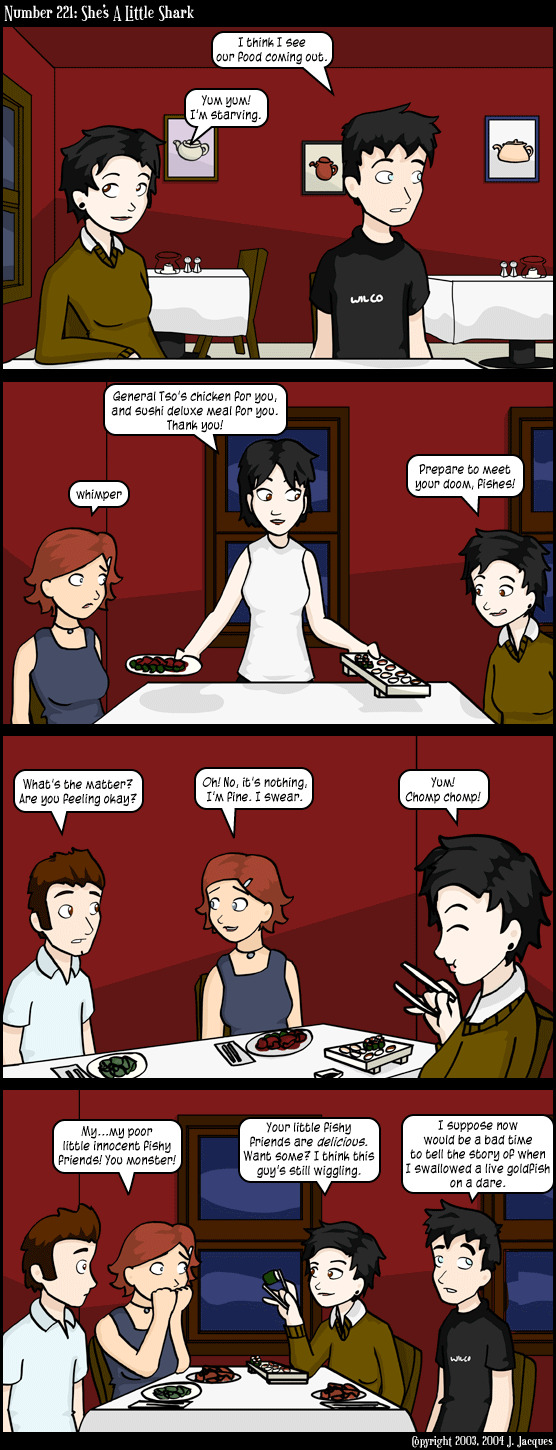
Marine Biology is not for the weak of heart. You knew what you were getting into when you took on that major, Ellen. But yeah, while I’ll get more into detail as to what I think about the art shift at the end of the post, I’ll say here that I like it as a natural evolution. It seems like every time Jeph improves, the face is the bit that gets the most focus every time. Remember just last post when I was complaining Jeph wasn’t talented enough to portray the silent emotion he wanted to in Faye’s face? Now, I feel like he probably could.
The date goes well enough, and the evening comes to a close:
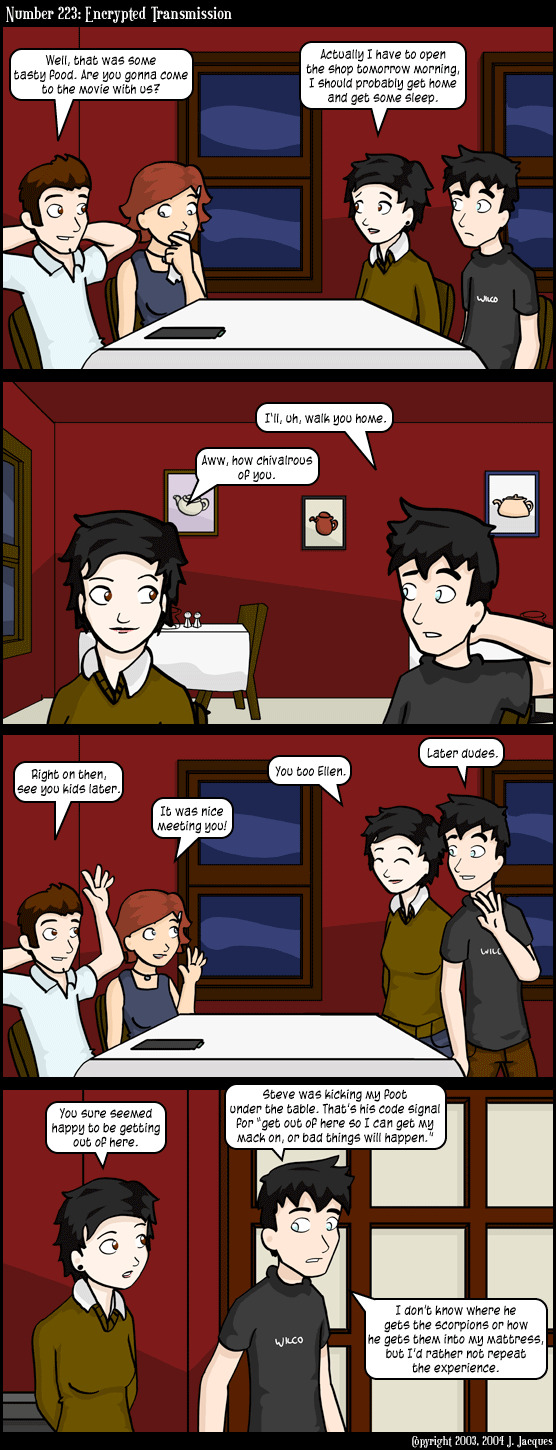
My bet is that Steve’s like the Pied Piper of arachnids. I’d believe it were that the case, at least. Also it was mentioned to me that Marten probably did have the eye-shine like the rest of the cast did, but his eye color just made it harder to spot. In this page, that becomes clearer - still hard to see, but much easier than previously.
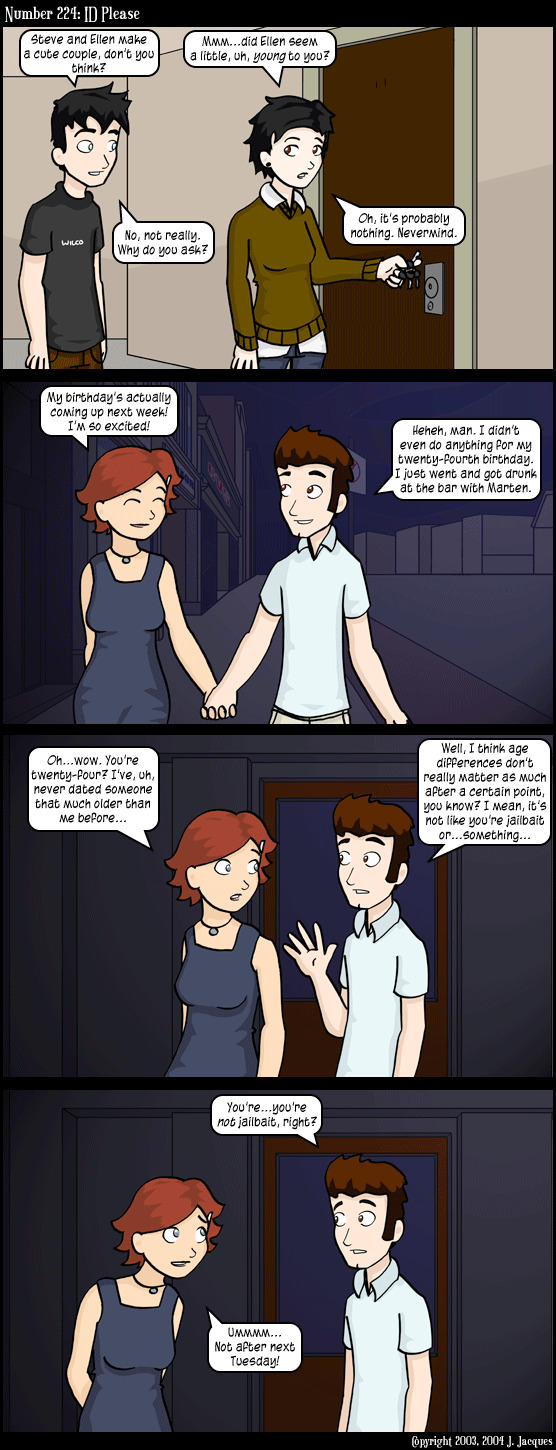
Oooh dear. Steve’s in some hot water now. Also I just realized that as of yesterday I’m as old as Steve is. Good God, I’m an actual full-blown adult. Christ.
...I’m going to put off thinking about that for too much longer as we move onto the rest of this batch, okay? Okay.
Anyhow, Dora invites Marten into her apartment for some coffee where she cuts right to the fucking chase:
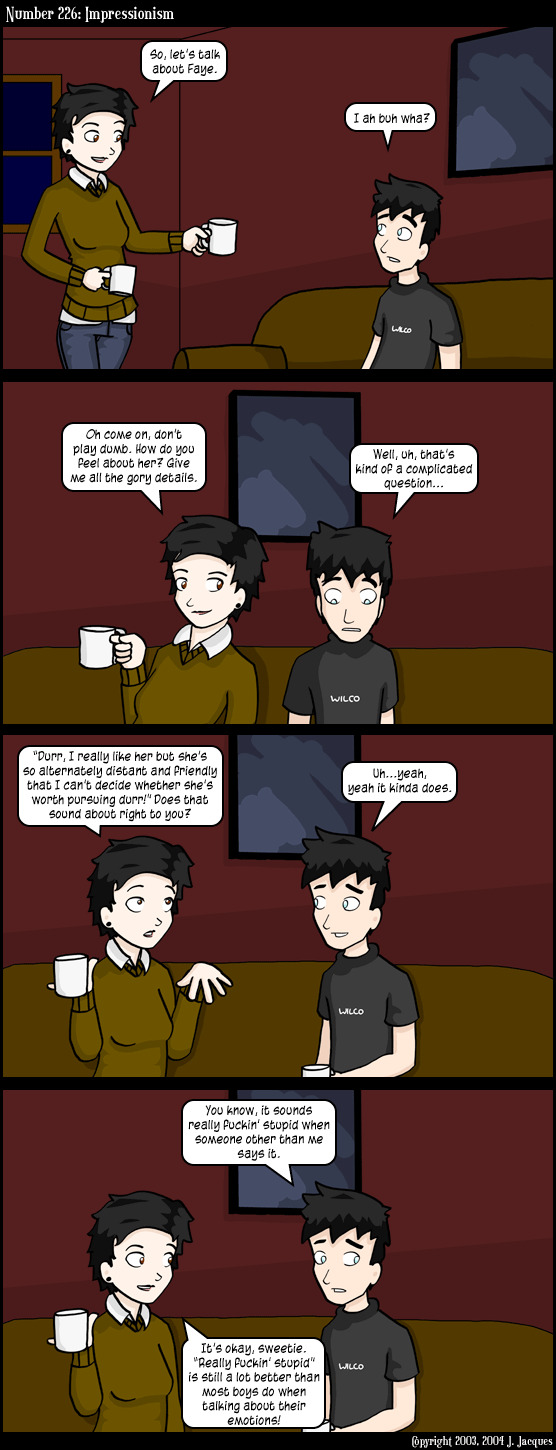
It’s probably for the best you read the conversation yourself, they’re pages 226-228. I say this mostly because I really don’t have anything to add or comment on here - Dora’s a smart lady who gives good advice here, makes it clear that while she’s interested in Marten she wants him to be happy, and all-in-all is one of the coolest people ever. Go Dora!
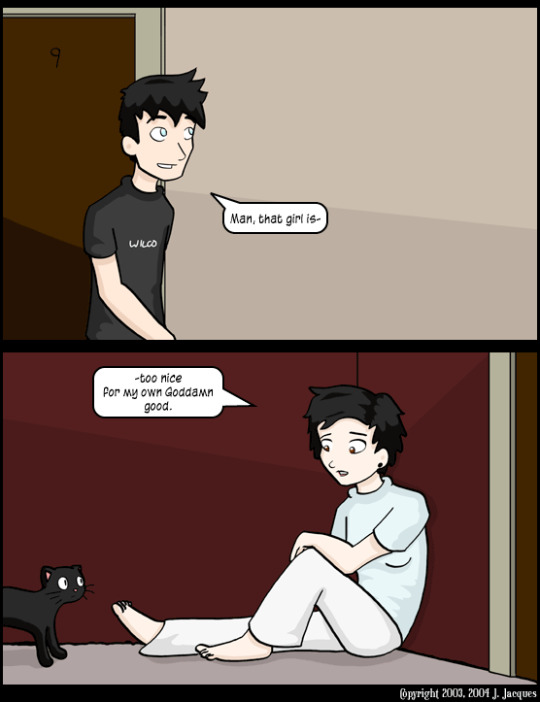
Go... Dora. Oh. Well, I still think you’re cool. Let’s give this woman some time and cut back to Steve and Ellen!
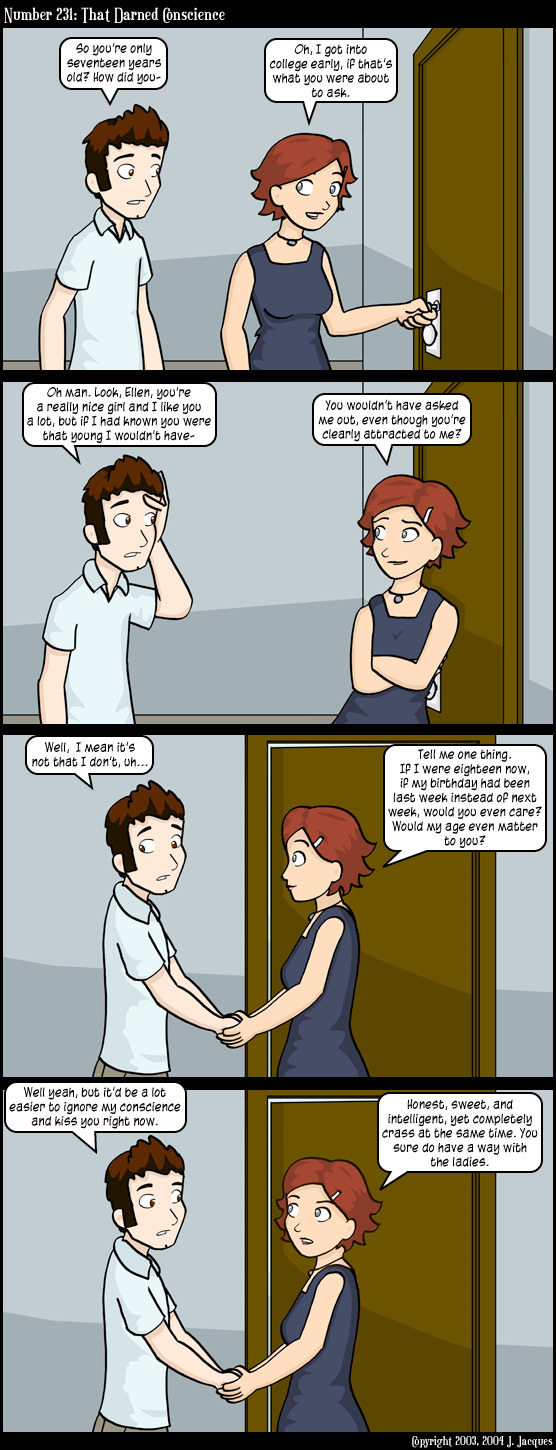
I have some things to say about this situation that I’ll touch on a little bit later. Marten gets home and makes it clear to Faye that nothing happened between himself and Dora. While quite clearly relieved, she’s a touch confused.
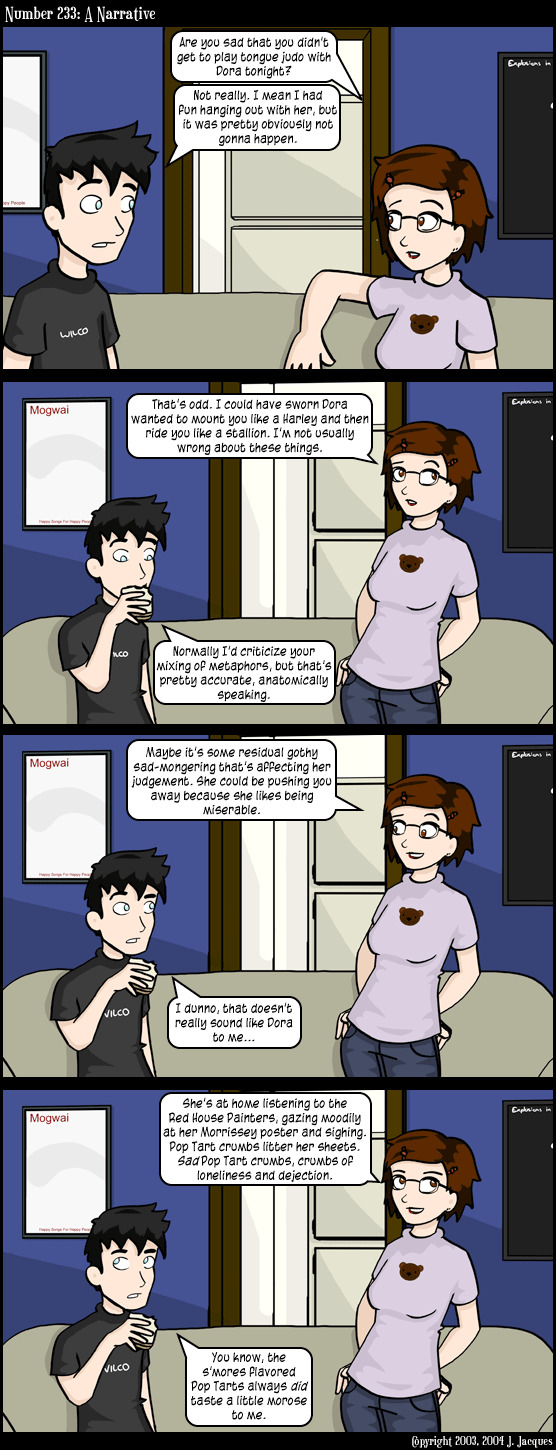
So I’m not the only one who feels strangely sad whenever I eat a s’mores Pop Tart? Oh who am I kidding, I’ve got depression, I’m always fucking sad. And hey, speaking of sexy times, Pintsize throws his proverbial hat into the ring!
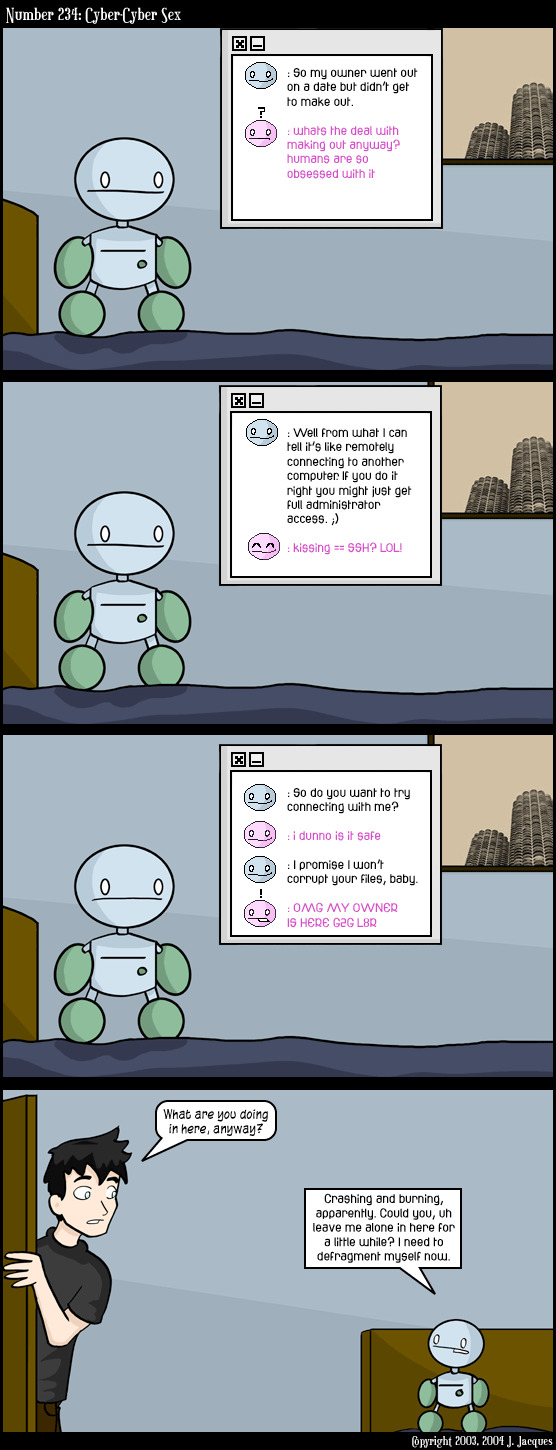
Honestly, I kind of knew I should’ve kept track of that pink Anthro PC, but would you believe me if I told you they never got a name? Also could AI fuck over IM? My bet is that 2004-speed internet wouldn’t exactly make it smooth. But man, imagine having sex over the ‘net on Fiber.
...too much? Too much.
The night ends, Steve parts from Ellen telling her he needs a couple of days to sort his head out, and Faye comforts Marten...
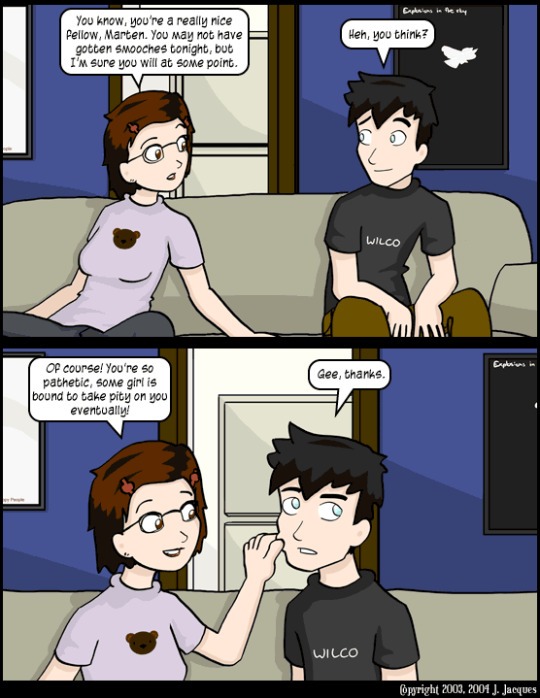
...in, erm, a very Faye way... oh hey, Faye, Fae! I wonder if that was intentional on Jeph’s part. Probably not, Faye isn’t quite a Maniac Pixie Dream Girl. For one thing, she’s better written.
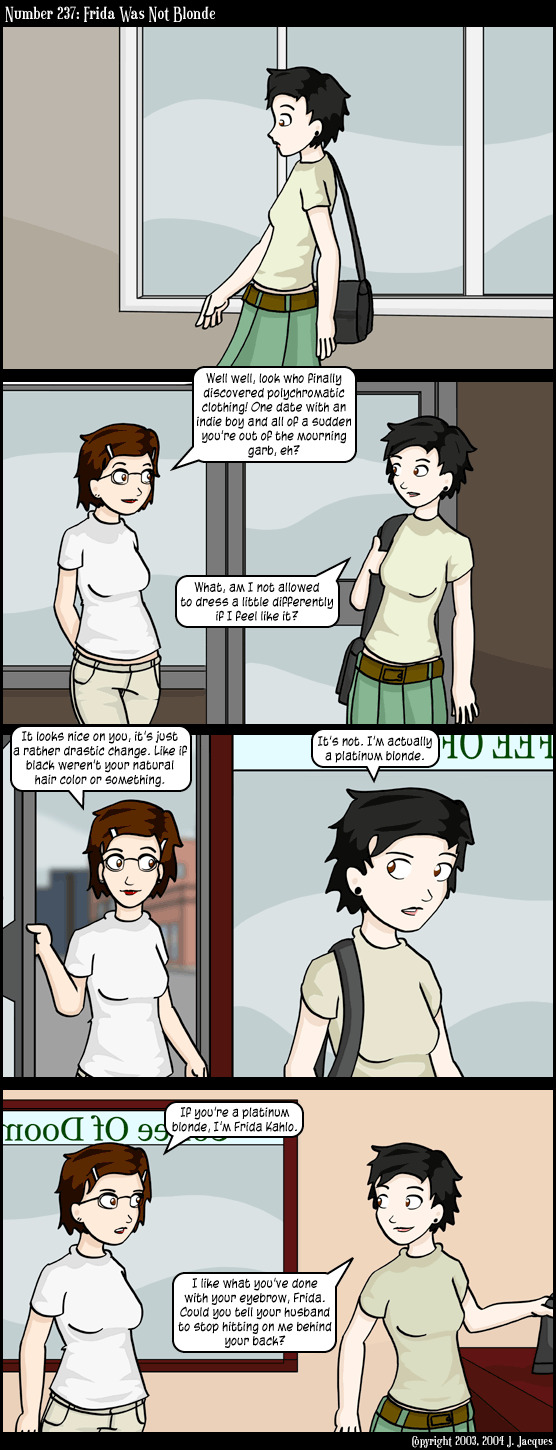
If memory serves, I think Dora mentioned she was a blonde previously? Either way she’s crystal clear with it now. Also, while I complimented Jeph before on his faces... I’m not going to lie, he could stand to improve drawing skirts. I don’t blame the guy, I imagine skirts are fucking hard to draw.
Oh, and here we begin an annual tradition of Questionable Content:
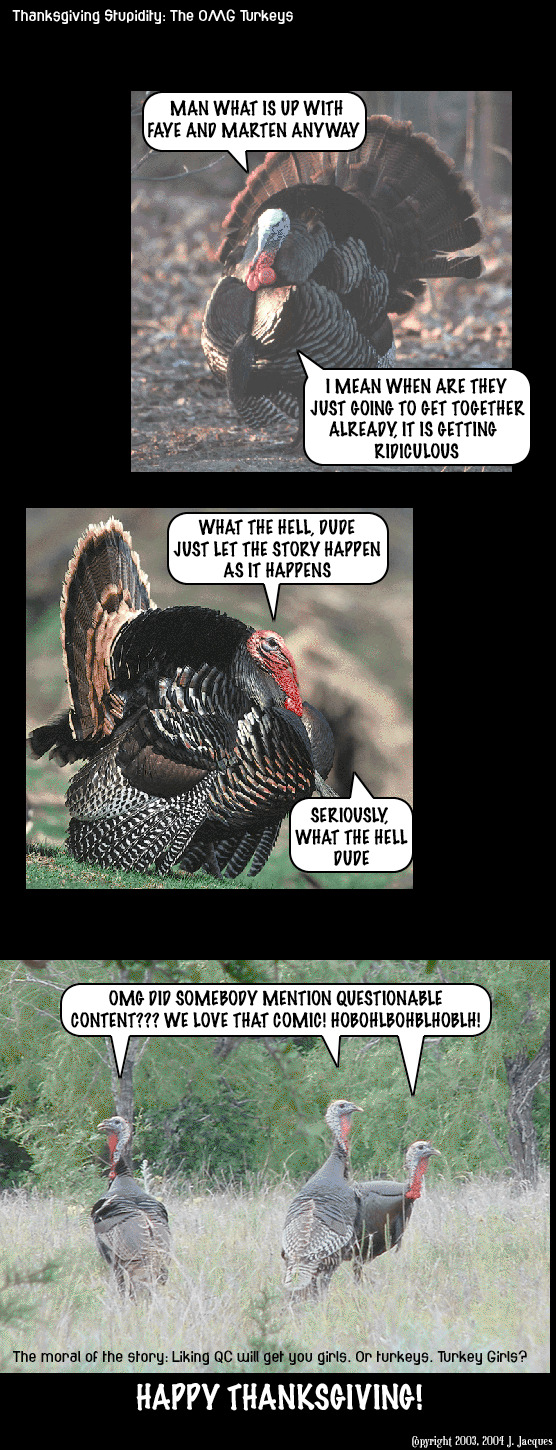
I’d like to start a petition for all Questionable Content fans to go by the fan-name “Turkeys” now. You with me, fellow Turkeys?!
...no? Eh, fair enough.
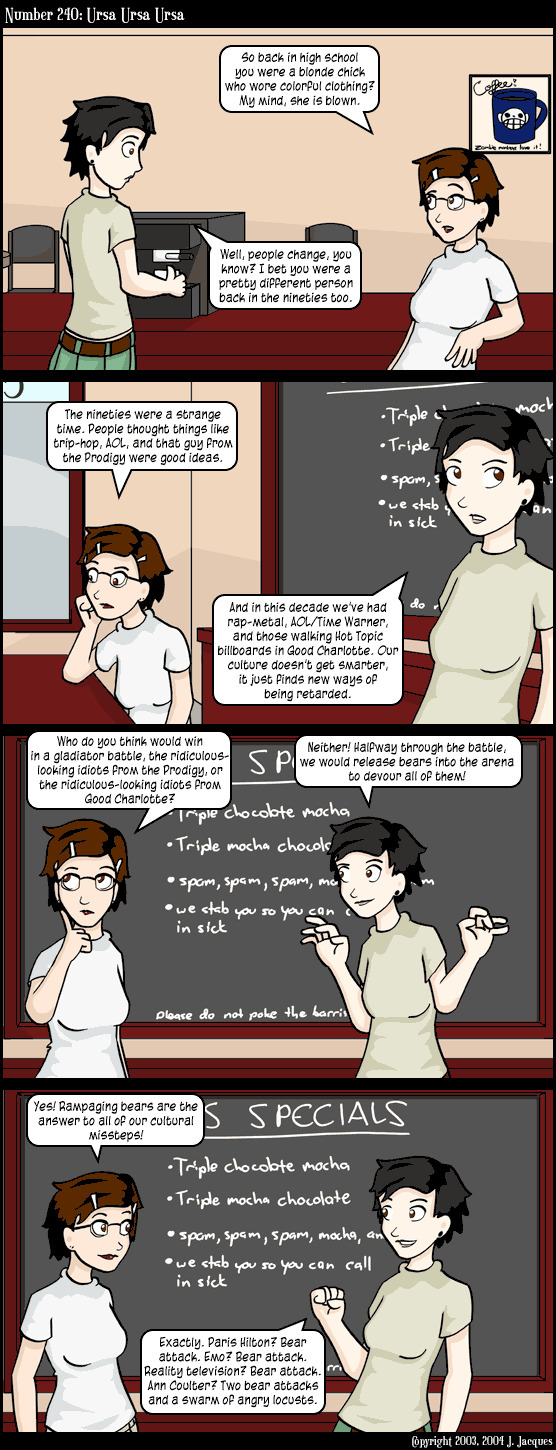
Here we get some interesting information. At least, it gets interesting in the wake of what comes up later - the timescale is more-or-less confirmed here that this takes place around the early to mid 2000s, likely 2004 or so since that’s when the comic was written. I always assumed, considering we have walking AI around, that the universe of Questionable Content took place in the near future... but rather, it seems more like it takes place in an alternate version of history where our technology is slightly ahead of the curve. And yet a lot of pop culture phenomena remained as it did in our version of history, if what they’re saying is true. Again, this doesn’t get super relevant until later comics where we see just how far advanced the technological level in QC has become.
Ellen drops by the Coffee Shop for some advice:
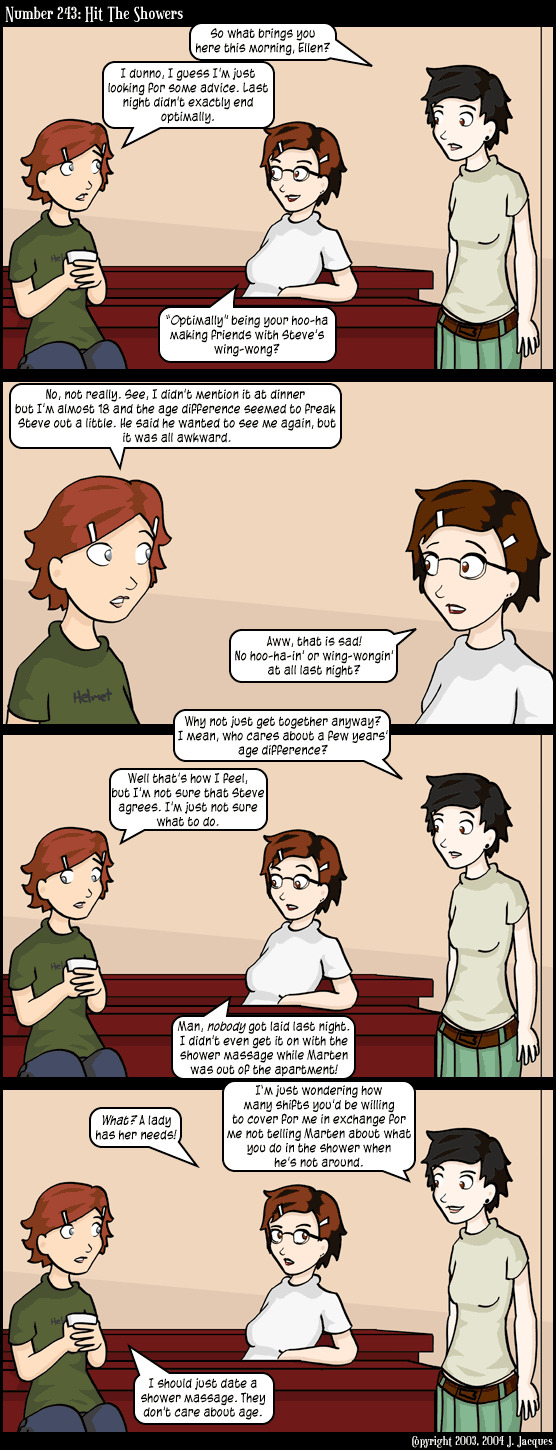
Faye’s gotten a LOT more open recently. Back near the beginning of this comic she would never, never openly admit to giving into any kind of carnal need, and now here she is candidly talking about private shower times.
And while they’re discussing things at the Coffee Shop, Marten and Steve are having their own conversation back at the apartment:
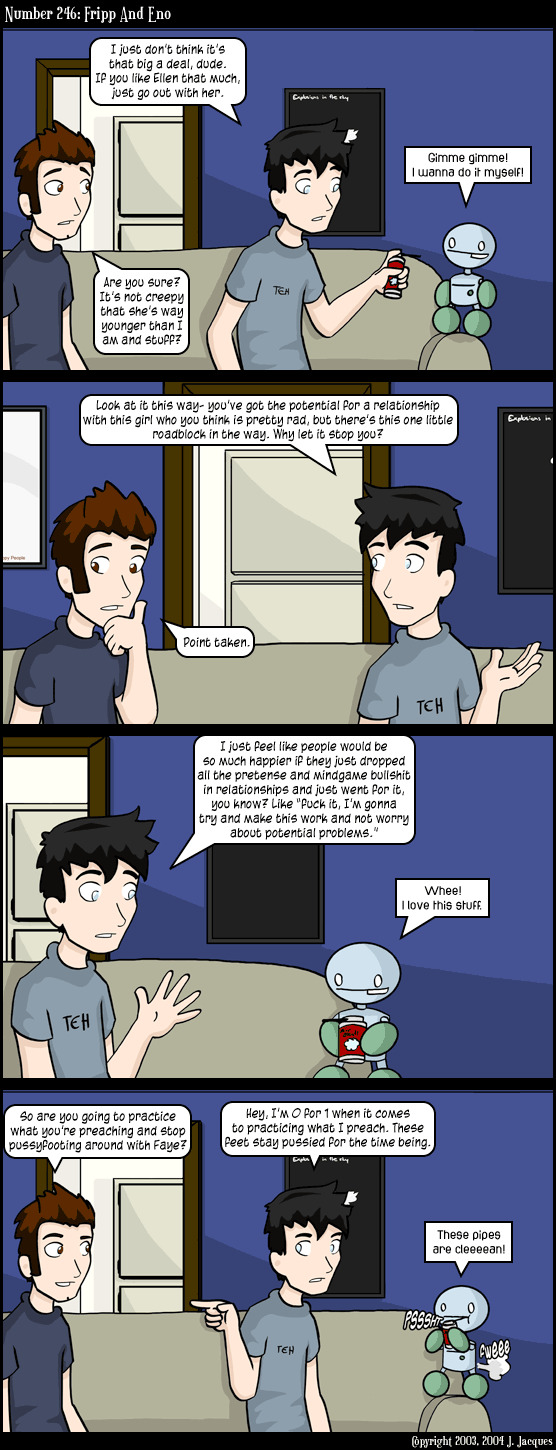
Now here I need to put in my two cents. The characters make a point of saying how they don’t really think the age difference is that big of a deal. Were she legal, which she will be in less than a week, there’s no real problem with an 18 year old dating a 24 year old. I know this is entirely a matter of personal opinion and I fully expect people to disagree with me here. I also suspect this is going to make me sound like a prude, but... yeah, I think there is a problem, there.
Ellen’s a freshman in College. She’s JUST turning 18. While she’s shown to be intelligent enough to get into college early - and good on her for that - she lacks the emotional intelligence or maturity to really strike out into a relationship with someone six years her senior. And Steve, for his part, is too old to get anything out of a relationship with someone so much younger than he is. There’s no real connection there, the difference in emotional maturity is going to make itself evident before too long and the relationship is more prone to self-destruct.
Like I said, feel free to disagree with me there. If you feel like there’s room for a relationship in such an age gap, let me know. I wouldn’t mind starting a conversation or changing my mind, but that’s where my mindset is there - it just wouldn’t work out.
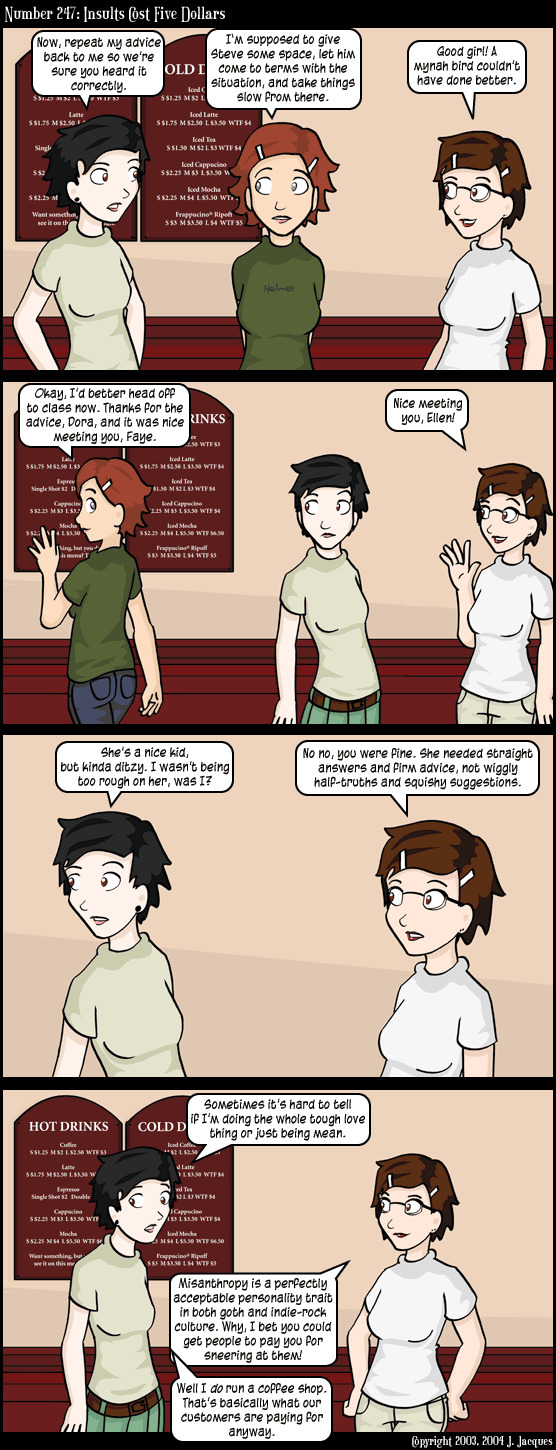
Remember that last line Dora said. It’s going to get much funnier later, to the point where part of me wonders if that was deliberate foreshadowing on Jeph’s part.
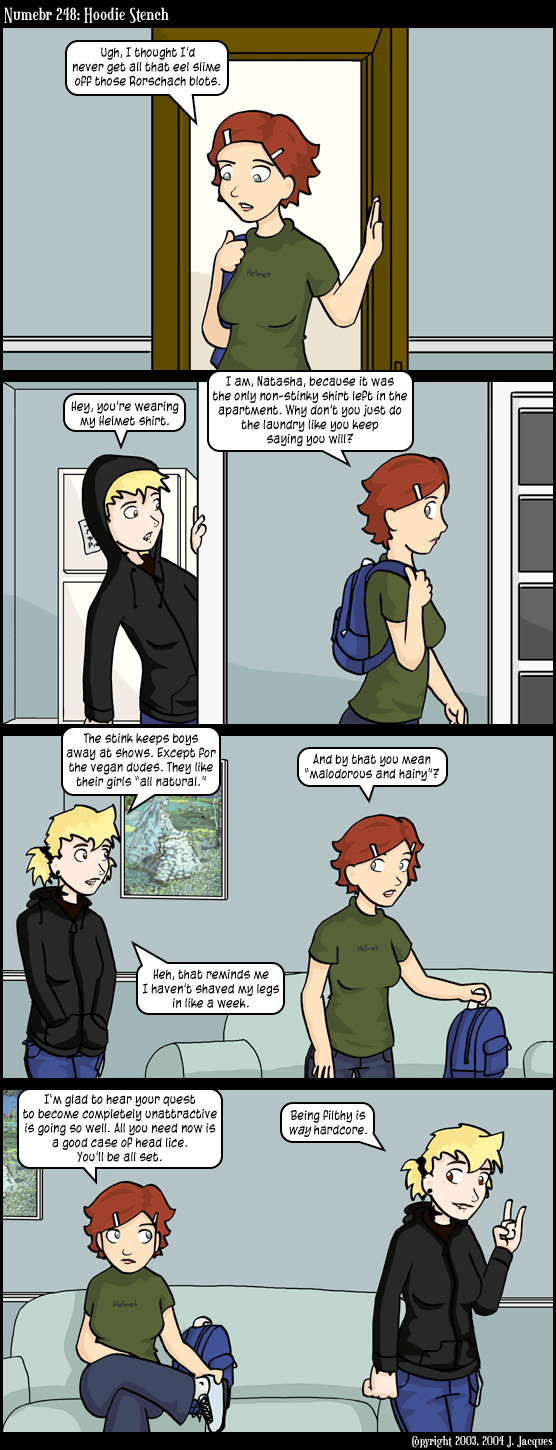
And here we welcome Ellen’s roommate, Natasha. My oh my, characters are building up, ain’t they? Just give it time, guys. It gets so, so much worse.
(Also am I the only one stuck on that first panel? Just... I know they already made the joke about her dual-major but there’s something so surreal to that I kind of can’t escape it)
And now, to round out our batch of 50:
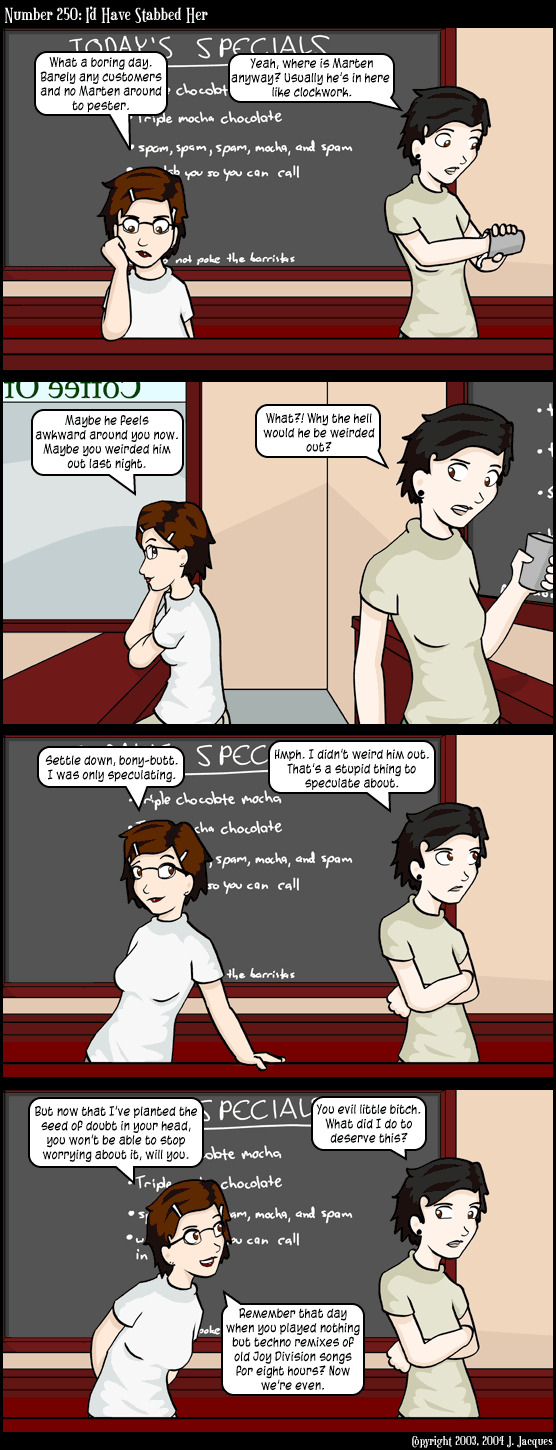
Wow. It seems like Dora’s a touch more insecure than she lets on, huh? She seems so cool and in-control of herself that moments like this where it’s surprisingly easy of her to accept that she may have weirded the object of her affections out are much more blatant.
Now that we’ve reached the end of the batch, let’s do our usual beginning and end comparisons:
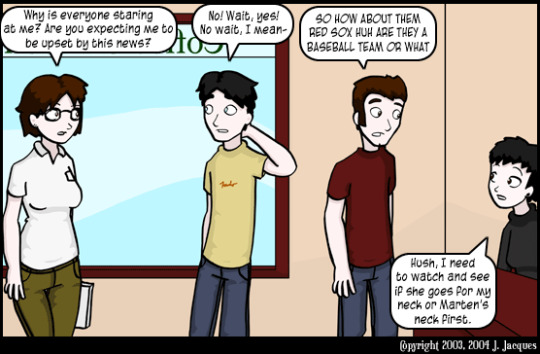
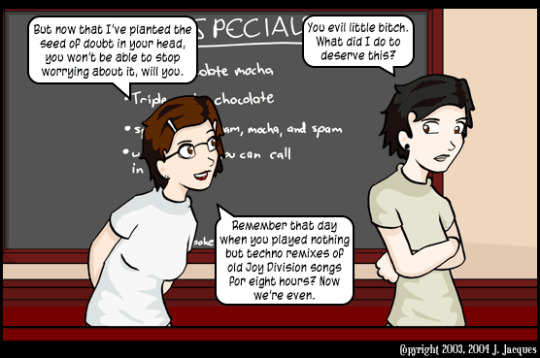
Like I said before, Jeph has clearly put more detail into the faces. He’s taking steps in the direction of “realistic cartoon” if that makes sense, further details in the wrinkles of their clothes, their bodies looking more defined, that sort of thing. I can’t really decide if I like this newer style better than the older one, but it’s no question that the newer style is a technical improvement. Nice work!
So what’d I think of this batch? Eh... plot happened, I suppose, but it feels like not much ended up happening. I dunno, for my money this felt a lot slower than the last batch... but then again, last batch had Amanda drop by for a visit, so that may have something to do with it. Either way, we have outright confirmation if we didn’t think so before that Dora is super into Marten, but it’s also made clear she’s not going to step in between the dance he and Faye are partaking in right now. Whether this is a good or a bad thing is entirely up to personal opinion, I suppose. I dunno, I feel like having Dora as a potential wild card offered the possibility for drama to shake up the dynamic going on, and without her I fear the dynamic may stagnate.
I mean, I know exactly how the dynamic’s going to go because I’ve read it, but you get the point I’m trying to make here.
Anyhow, you know what time it is now - data analysis time! In this batch of 50, we have...
Marten: 34/50 – 68%
Faye: 29/50 – 58%
Dora: 24/50 – 48%
Ellen: 15/50 – 30%
Steve: 12/50 – 24%
Pintsize: 11/50 – 22%
Natasha: 2/50 – 4%
Miéville: 2/50 – 4%
Grand Total:
Marten: 200/250 – 80%
Faye: 192/250 – 76.8%
Dora: 75/250 – 30%
Pintsize: 61/250 – 24.4%
Steve: 34/250 – 13.6%
Ellen: 18/250 – 7.2%
Amanda: 12/250 – 4.8%
Sara: 7/250 – 2.8%
Jimbo: 5/250 – 2%
Turing: 4/250 – 1.6%
Raven: 3/250 – 1.2%
Miéville: 3/250 – 1.2%
Scott: 2/250 – 0.8%
Natasha: 2/250 – 0.8%
Ell: 1/250 – 0.4%
Personally, I won’t be satisfied until Jimbo overtakes Sara in his number of appearances. You can do it, Jimbo! I BELIEVE IN YOU!
...erm, in any case, tune in next week for the thrilling next installment of QC! You ready for more backstory on our main characters? I know I am! See you then.
1 note
·
View note